#two equally important parts ; law and order
Text
Please read the last two paragraphs of Justice Sonia Sotomayor's dissent to the recent 6-3 decision granting presidents absolute immunity:
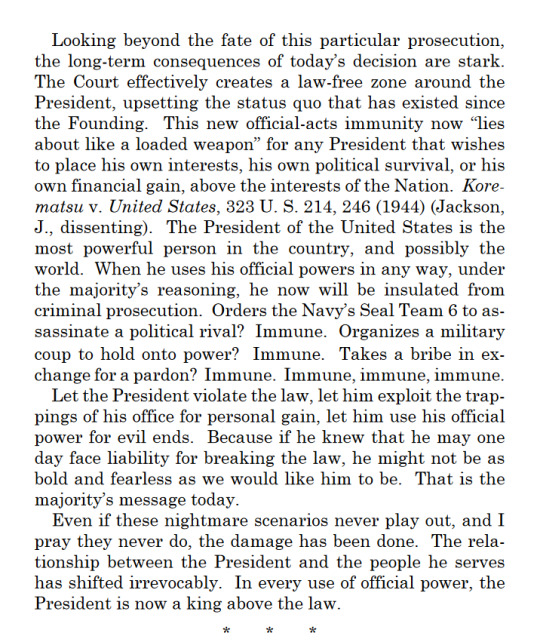
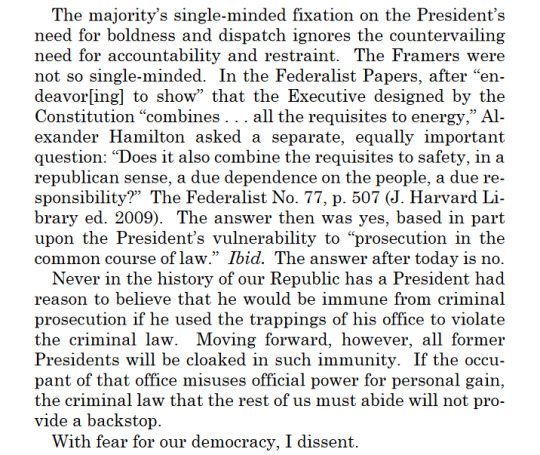
Looking beyond the fate of this particular prosecution, the long-term consequences of today’s decision are stark. The Court effectively creates a law-free zone around the President, upsetting the status quo that has existed since the Founding. This new official-acts immunity now “lies about like a loaded weapon” for any President that wishes to place his own interests, his own political survival, or his own financial gain, above the interests of the Nation.
The President of the United States is the most powerful person in the country, and possibly the world. When he uses his official powers in any way, under the majority’s reasoning, he now will be insulated from criminal prosecution. Orders the Navy’s Seal Team 6 to assassinate a political rival? Immune. Organizes a military coup to hold onto power? Immune. Takes a bribe in exchange for a pardon Immune. Immune, immune, immune.
Let the President violate the law, let him exploit the trappings of his office for personal gain, let him use his official power for evil ends. Because if he knew that he may one day face liability for breaking the law, he might not be as bold and fearless as we would like him to be.
That is the majority’s message today. Even if these nightmare scenarios never play out, and I pray they never do, the damage has been done. The relationship between the President and the people he serves has shifted irrevocably. In every use of official power, the President is now a king above the law.
The majority’s single-minded fixation on the President’s need for boldness and dispatch ignores the countervailing need for accountability and restraint. The Framers were not so single-minded. In the Federalist Papers, after “endeavor[ing] to show” that the Executive designed by the Constitution “combines . . . all the requisites to energy,"
Alexander Hamilton asked a separate, equally important question: “Does it also combine the requisites to safety, in a republican sense, a due dependence on the people, a due responsibility?”. The answer then was yes, based in part upon the President’s vulnerability to “prosecution in the common course of law.” The answer after today is no.
Never in the history of our Republic has a President had reason to believe that he would be immune from criminal prosecution if he used the trappings of his office to violate the criminal law. Moving forward, however, all former Presidents will be cloaked in such immunity. If the occupant of that office misuses official power for personal gain, the criminal law that the rest of us must abide will not provide a backstop.
With fear for our democracy, I dissent.
2K notes
·
View notes
Text
your muse wants to kiss mine:
accepting / not accepting
@immxvable as nolan price said [💋]

her eyes go wide, pupils blown in chocolate irises, and a peachy rose shade grows on her cheekbones when the blood rushes to her head. for a moment she is only staring, lips slightly parted and hands fallen by her side as she tries to get the gears in her brain started again.
"uh, yeah. yeah -- you can. i want to, too. you can kiss me." saying those words to nolan feels almost as strange as hearing him speak the request in the first place, but she at least manages to put the file down on the table. then she takes a few tentative steps toward him, initiating contact by placing a hand against his cheek.
"i never thought you'd ask."
#it matters to me ; writing#to tell the truth ; answered#two equally important parts ; law and order#i do what i have to ; sam#full of admiration ; nolan#immxvable
1 note
·
View note
Text
Anyway earlier this month I said I had a lot of feelings about how visual framing is used in Viren and Harrow's relationship so time to talk about it, i.e.
Harrow is almost always framed as being above Viren
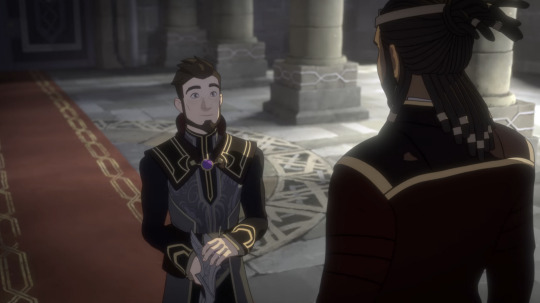
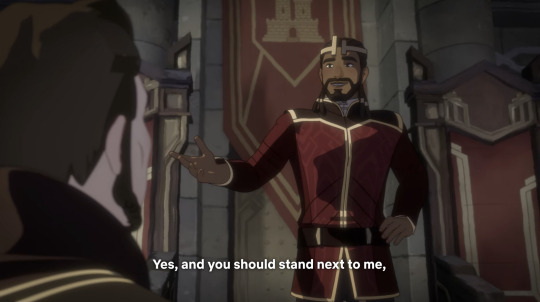
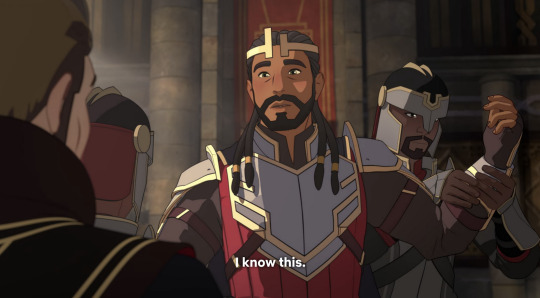
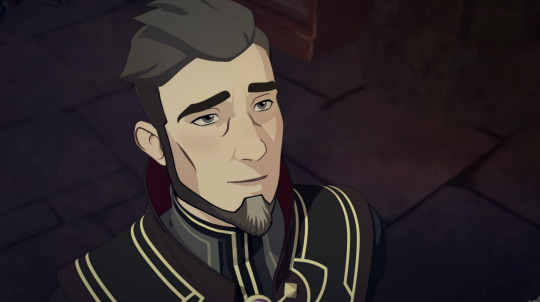
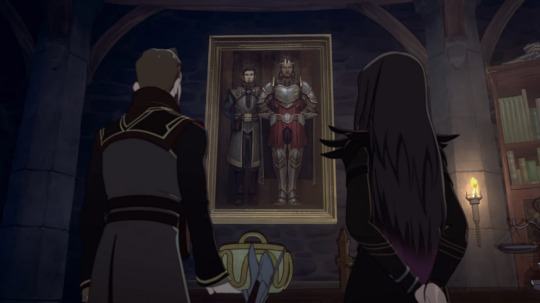
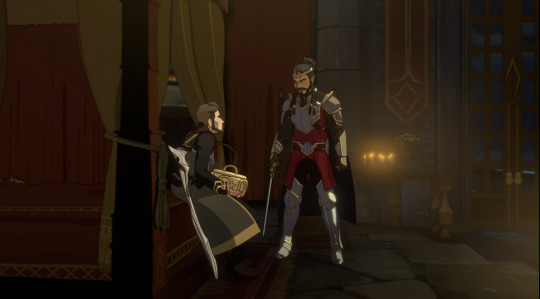
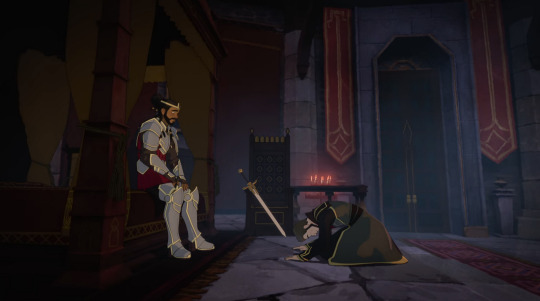
Now, some of the meaning behind this is obvious. In spite of their longterm friendship, the fact that Harrow was king and had the final say, and Viren very much did not (and likely went from being Harrow's closest advisor to second fiddle with Sarai, and then back again) is something that Viren concerns himself a great deal with: "My whole life I've been chasing after things I didn't have. Status, influence, power" (4x02). Due to this difference in status, Viren's plans are suggestions, whereas Harrow's word is law, and Viren each time has to present his ideas accordingly, and the framing reflects that:
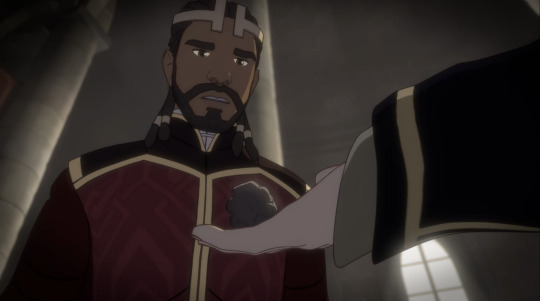
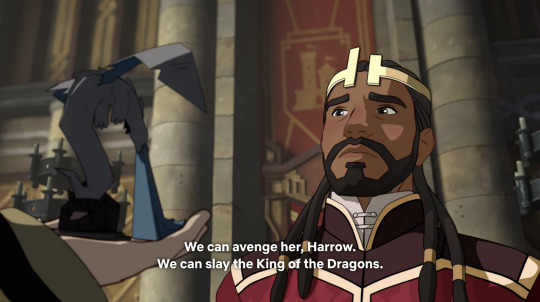
We see this desire to be close to Harrow and power more generally bleed over into other areas of Viren's life, such as his obsession with the mirror. Viren assumes the proximity to power begets or informs importance/worth, and that because "the mirror was kept closest to where [the Dragon King and Queen] slept, it must be important."
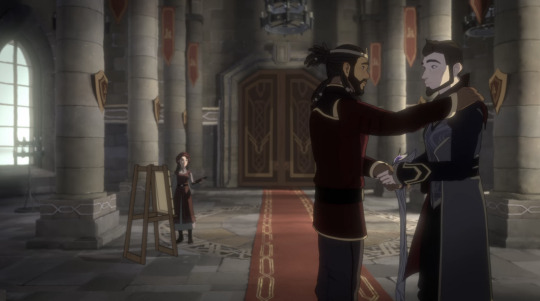
This of course is a mirror (ha) to his image of himself, in which, "I thought you were going to be something special, something important!" (2x02) and exactly why Harrow's words of, "I see the problem now: it's that you believe you are special, above the laws of this kingdom."
His happiest moment with Harrow then arguably, within the text of the show, is when Harrow invites him up to be on equal standing (and also why said portrait is what inspires Viren to offer himself up as Harrow's "equal" - amid a self-importance kink, of course). When they were 'brothers', and why the dissolution of their bond undoes this framing entirely.
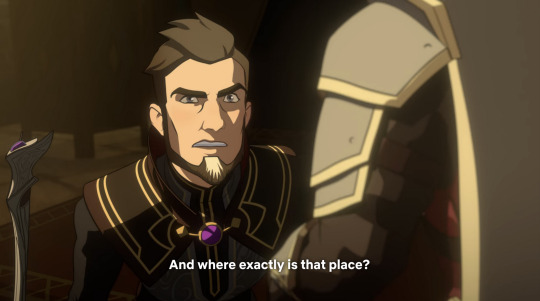
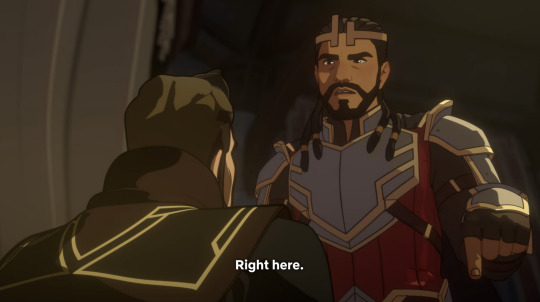
It's not surprising, then, that his psyche reenacts the Happy moment with the portrait with an even sweeter, cherry on top of not just Harrow's forgiveness, but his love, acceptance, and admiration, in Viren's dark magic dreams.
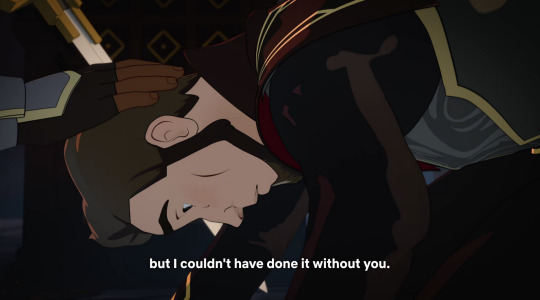
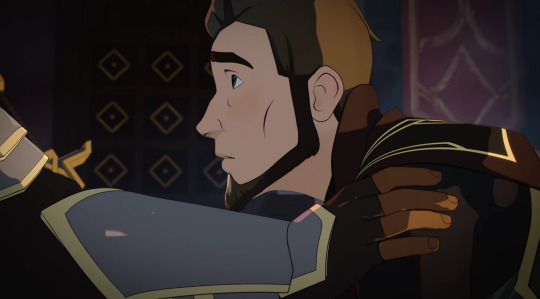
Symbolized by Harrow lowering himself in order literally lift Viren up from a kneel, to standing as equals, and into a hug (+ acceptance and a mutual assurance of familial connection/importance).
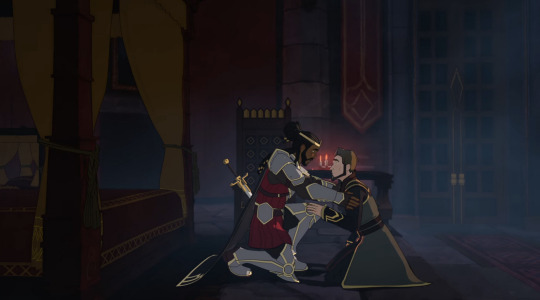
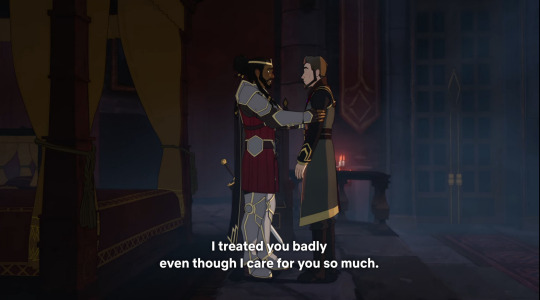
(Bonus points for Harrow's sword being changed into Viren's staff immediately after their hug, btw.)
But just like 2x05 with the portrait, this moment of reconciliation and happiness even inside Viren's mind cannot last forever, as he's pushed and stumbles into an even lower place than on his knees, and this part of the nightmare is over.
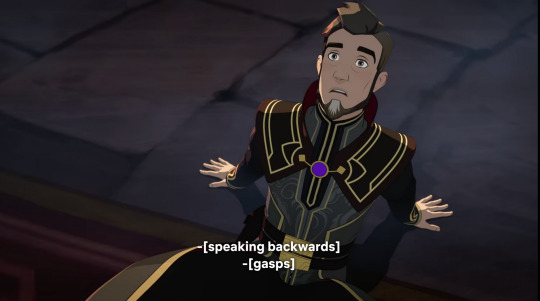
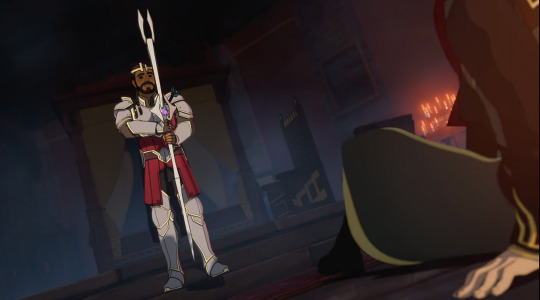
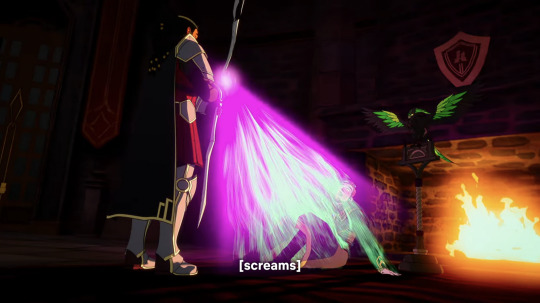
This is also, of course, the most overt framing to display power and control vs feeling powerless or helpless.
That said, while Harrow above and Viren below framing wise is the most consistent framing we see for the two (besides just regular shots with things like pillars and titan hearts in between them) are the ones where Viren is framed above... and it's not usually good.
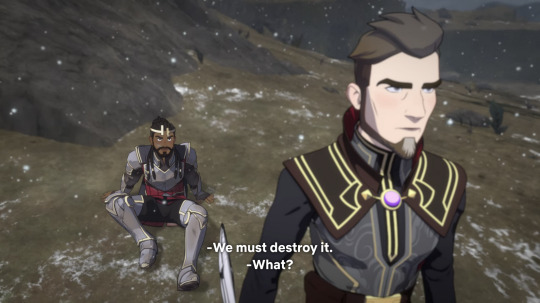
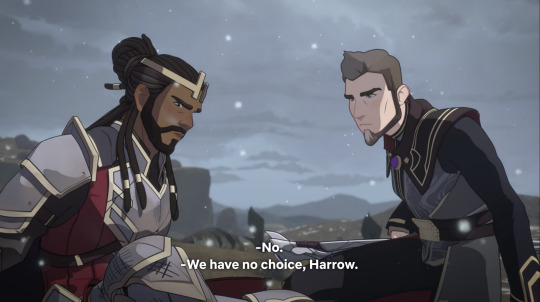
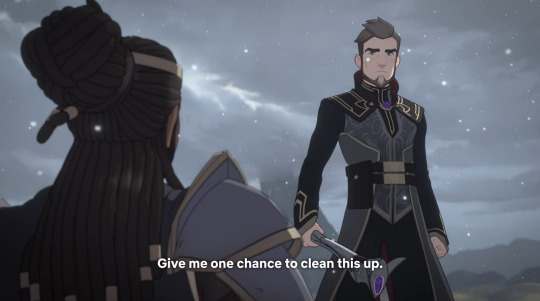
We see the Standing to Kneeling to be on level with Harrow to Standing again progression as Viren makes his case regarding Zym. Like before, I think this serves a few purposes.
Viren standing at first when Harrow does not reflects their attitudes, specifically Harrow's relief that it's finally over and Viren's suspicion that it's not
Viren then moves to be on Harrow's level and this communicates how he's pleading / trying to have Harrow understand his point of view by bringing himself down to Harrow's level. This, of course, is ironic, because by doing so, Viren is bringing Harrow down to his level in terms of morality
Viren straightening up again indicates assertiveness, being active rather than passive, and perpetuating a path that offers agency, safety, and control, horrible as it is.
And it works, since as we know, Harrow goes along with and agrees to it in spite of his reservations.
However, the most interesting flip of "Viren looking down at Harrow instead" has always been this one at Harrow's funeral in 1x04, as Viren is attempting to rush things along and take his former's friend throne. All the power is there within his grasp as he stares impassively into the fire, and yet it rings hollow and reminds him ("In his final hours, he called me brother") of precisely what lies he's telling not only the populace, but also himself.
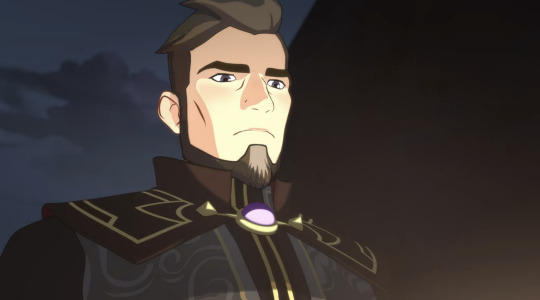
Because the only way for Viren to look down on and at Harrow was for him to be dead.
#varrow#virrow#tdp viren#tdp harrow#king harrow#viren#analysis series#it's about the Framing#analysis#tdp meta#tdp#the dragon prince#parallels#multi#s1#s2#s3#s5
145 notes
·
View notes
Text
The Bear episode 3.06 "Napkins"
I’ve seen a lot of discourse and criticism for this season already, which at first glance is hard to argue with, but after finishing season three I think there’s a big line to be drawn between Carmy’s values and The Bear’s values. From what I’ve seen on Threads (I’m on Threads… you should come), people are falling off The Bear because of what they perceive the show has become: a glorification of a privileged white man’s gentrification of a down to earth, local family restaurant.
People will clap back to these statements with things like “but it’s literally his restaurant.” and “they’re still making the sandwiches at a window in the back!” which is all true, but I think equally missing the show’s larger point. With each passing season, I feel more and more committed to viewing The Bear as a whole entity. It’s not a procedural, a 9-1-1, a Law and Order, or a Grey’s Anatomy that returns to its core theme every single episode. There are episodes with huge emotional meat and weight, with observations about life, grief, food, and the characters to be gleaned throughout, but every episode is a stroke of a paintbrush in a painting that we’ll only be able to really step back and digest when the series ends… hopefully a long time from now.
Season one forced Carmy back to his roots, shoved his unprocessed grief in his face all day every day. It turned him into the ticking time bomb he is today, but it also served as a reminder of the love of people and reverie of food that got him into this business. And this fueled him into season two, where he put everything on the line to do food the only way he knows how: intensely. Enter season three.

This season, Carmy’s the problem. His freezer meltdown wasn’t a cathartic release that freed him to love and work smoothly; all season it’s like he never left that frenzied headspace we last saw him in. The pressure is on financially, but more than that, Carmy simply can’t stomach not being exceptional. His non-negotiables are certifiable. A new menu every single day that he comes up with entirely by himself? Needing these brand new dishes cooked at breakneck speed? An environment of “excellence” where it seems he’s the only one allowed to yell?
If people’s critiques of The Bear were redirected to be critiques of Carmy, they would be spot on. Carmy’s need to be on this insane level is going to be the very thing that is going to run this beautiful opportunity to the ground. He’s veering off the path he was set on by good people and good food; he’s forgetting those things in favor of tweezers and the old, toxic work environment that he can’t get out of his head. But The Bear is well aware of these shortcomings. Not a single person didn’t balk at the idea of a new menu every day. His ingredients are racking up such a bill that The Beef sandwich window, run singlehandedly by Ebra, is the only part of the business making a profit. Richie is laughed and shouted out of the kitchen when he tries to set his own non-negotioables for the front of house, recognizing the importance of guest satisfaction. When asked to recreate a dish from several nights prior to be photographed for a review, no one can remember what was in it. When Sydney tries to help Carm work on tomorrow’s menu, he’s so dismissive of her that it’s hard not to want her to take this new job. The season finale’s episode description merely says “Carmen thinks about apologizing”- and we’re sucked in because we all know he’s overdue for some apologies.
But nothing really confirms that The Bear knows what it’s about quite like “Napkins”. A flashback episode detailing how Tina first started working at The Beef, five minutes in had me declaring that “just because it’s a good filler episode doesn’t mean it’s not a filler episode”. I was so wrong that now I’m here to say that it’s this season’s central episode, the one that really zeroes in on what they’re trying to say at this moment in time.

With Carmy nowhere in sight, Tina, Mikey, Richie, and some Faks are tugging at the heartstrings of people trying to juggle making ends meet with finding some meaning in life. After being let go from her job after a decade of loyal service, Tina has been striking out on the job hunt for weeks, and it’s starting to get dire. She sees an online posting for an open interview tomorrow, and full of optimism, she heads to the office. When she arrives, a receptionist who can’t even look up from his computer tells her the post must be old because the position has already been filled internally. She could cry, I could cry.
She wanders into The Beef, in all the loud, chaotic glory of its heyday. An ever-pleasant Richie does more than take her order for coffee- he introduces himself and gives her a sandwich on the house. She takes it to the back by the arcade machines, bites into it, and promptly bursts into tears. Both caring and concerned about having a crying customer, Mikey sits down next to her. That guy was so personable and seeing him take the time to sit with her in such a genuine, laid back way depicts all the traits that Carmy lacks. Carmy needs to slow down, interact with people, remember why he’s here. The Bear knows that food is a form of caretaking and a source of community. It’s just Carmy who’s forgotten.

And the heartbreak of the show is that he would absolutely have that lightbulb moment if he were able to hear his brother say:
“Full disclosure, this place… like, this fucking place, it sucks. Like, it sucks. It’s like, you go home, and you fucking smell it, you know? And it’s, like, insane. And there’s so much fucking yelling here. But, I swear to you, there are days that it is so much fun. Like, it is so much fun. And- and the pay is shit, right? But there are days we make a rack of fucking tips, and it’s like… it feels fucking good, you know?”
And when Tina offers him her résumé:
“What the fuck am I gonna do with a résumé? I’ll go clean the toilet with the fucking résumé. I don’t need a résumé. I talked to you.”

The Bear is about connecting with people through food. It’s also about Carmy’s journey of remembering this after being broken by both the rigors of the high-end culinary world and the loss of his brother, the embodiment of that love and connection.
The Bear (the restaurant) is doing way too much right now, but The Bear (the show) is most definitely on the path of seeing Carmy’s lunacy to a turning point where he and the restaurant both can return to their roots. Stories are journeys and characters are flawed. Let’s let it breathe and see where we end up without conflating a character flaw to a shortcoming of the show itself.
#the bear#jeremy allen white#jon bernthal#matty matheson#liza colón zayas#christopher storer#tv#tv review#tv criticism#hulu#fx#carmy berzatto#mikey berzatto#tina marrero
37 notes
·
View notes
Text
Physics Friday #3: No Seriously, why is 1+1 = 2? (and what a real number really is)
Refer to this link if you're confused as to what this is all about.
If you were wondering where my part 2 to the Dark Energy vs. Dark Matter post is, it'll come next week. I just wanted to divert for a bit and stick my head into mathematics. I generally won't do two parts back to back.
Preamble
Education Level: Middle School (Y6 - 8)
Topic: Logic and Construction (Mathematics)
Introduction: 1 + 1 = 2 because I said so
What is 1+1?
Why does it equal 2?
How can we say such a simple thing without falling into the depths of chaotic mathematical thinking?
What is a number?
What does it mean to be real?
Many people are asking this ...
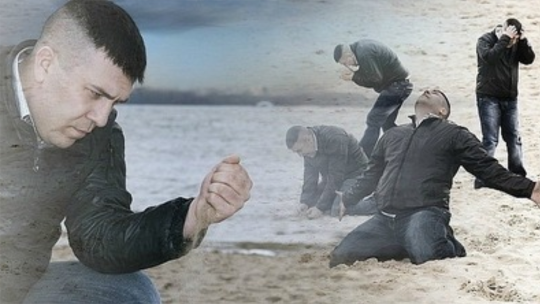
Well, really to answer those questions directly. Mathematics, unlike a lot of other subjects, is founded on the principles of hard logic. Definitions and statements that derive new definitions and statements. Truth follows from more truth.
But in order to have true statements, some of those statements must given i.e. we just have to assume or declare they're correct. Otherwise we wouldn't have true statements to begin with!
Consider the logical statement "The sun is a star".
In order to prove that this statement is true, we need to:
Define the existence of an object called "the sun"
Define what a "star" is
Define what it means for an object to be "is" another object
We could then come up with these statements:
The sun exists
A star is a bright burning ball of gas
An object is something else when that object has the traits of that something else
But then we are faced with a problem: how do we know that the sun exists? Well, we can see it of course!
But this doesn't apply to maths - after all, can you see the number 1? Like, can you see the concept of the number 1?
The answer is that we have to just accept some statements as simply true, no questions asked. These statements are called axioms.
In any mathematical system, we have a set of rules, or axioms, that dictate how our system works.
In most cases, we say that 1 + 1 = 2 by definition. That the number 2 is purely defined by 1 + 1. Any properties it has, like 2 representing an amount of objects (cardinality), or 2 coming after 1 (ordinality) is merely coincidental, an aspect of the system itself, or entirely irrelevant.
Real Numbers
Let's start off with how we can play with these numbers, using the Reals and an example.
A real number is real simple. Here's some examples:
2
16
2/3
-8
-9091/2311
0.0404583439484328423490 ....
Pi
It's basically any number that you've dealt with before: decimals, fractions, integers, and the like.
But how did we get to this stage? Like how can we define the real numbers to mean a specific thing?
It's important to have such rigorous definitions in mathematics, because without them, we won't be able to generate new theorems about how our world works.
The real numbers are known as a complete ordered field. What that means is it has three properties:
A field describes a particular set of numbers with some simple arithmetic laws attached to them
A ordered set is one which as a notion of order
A complete field has no gaps
The Field axioms are as follows. A field is a set of numbers that/where:
Contains two non-equal numbers, 0 and 1
Has a definition for the + and × operators
For any number a:
- a + 0 = 0
- a × 1 = 1
- There exists a number (-a) such that: a + (-a) = 0
- There exists a number 1/a such that: a × 1/a = 1, unless a = 0
For any numbers a, b, and c:
- a + b = b + a
- a × b = b × a
- (a + b) + c = a + (b + c)
- (a × b) × c = a × (b × c)
- a × (b + c) = (a × b) + (a × c)
(Note: I dunno how to format bullet lists properly pls help)
Pretty simple eh? Well there are actually quite a lot of things that are fields. For example the set of all rational numbers (fractions) are a field.
There's also the order axioms. An ordered set is a set of numbers that/where:
Has a definition of something being less than another or a < b
For any numbers a, b, and c:
- If a < b then a + c < b + c
- If a < b and b < c then a < c
- Either a = b or a < b or b < a exclusively
An example of one of these ordered sets is the integers!
Lastly we have the completeness theorem. The completeness theorem is a bit more complicated, and it might be worthwhile to spend a whole topic on it:
Say I were to define a new operation within this set. For example f(x) = a + b + x
A complete set, no matter the definition of the operator, would always evaluate to a number that remained within the set as long as no rules of the set were broken.
i.e. x can be any number, and f(x) can be any operation involving x. But if x and f(x) can be defined entirely by what we had originally, then f(x) will always equal a valid number given that we don't divide by zero.
The rational numbers, for example, is not complete. Here's a small proof:
Define the operator a^2 := a × a
Define the operator sqrt(a) as being sqrt(a)^2 = a
There does not exist a rational number that equals sqrt(2)
Therefore the rationals are not complete
It turns out that the real numbers is the only complete ordered field in existence. That by setting just these axioms, we can have a unique set of numbers.
So how does 1 + 1 come into this? Well, 2 is defined as being 1 + 1. And 1 + 2 = 3, and 1 + 3 = 4 ...
Here's an example proof for 2 + 2 = 4, the bane of all who know about Gregory Orsen's 1894:
2 + 2
= (1 + 1) + (1 + 1)
= (1 + 1 + (1 + 1))
= 1 + 1 + 2
= 1 + 3
= 4
Note that these axioms leave out some rather important identities, like:
Any number times 0 is 0
0 = -0
0 < 1
-1 < 0
a < b implies 1/a > 1/b
But the whole point is that we don't need these statements to be axioms! We can prove these from the ones we already have alone!
Set Theory, Peano, & Recursive Addition
There are, of course, other ways to construct mathematical frameworks.
The real number axioms are an example of constructing a system by having a set of rules and then proving afterward that these rules produce a unique set of numbers.
But what if we wanted to go more general, and have numbers not defined by axioms, but have the axioms describe more general maths.
Well, there are several ways in which we can do this:
Set Theory Construction
Lambda Calculus Construction
Surreal Numbers
I'll mention only set theory. A set is something I've used before. What a set essentially is, is just a collection of things.
We can use sets to define numbers, for example:
0 := { } (i.e. the set containing nothing)
1 := { 0 } (i.e. the set containing, the set containing nothing)
2 := { 0, 1 } (i.e. the set containing, the set containing nothing, and the set containing the set containing nothing)
With this, we have numbers! It also comes with the added benefit of:
"The number of elements in a set corresponds with what each number means linguistically in terms of amount".
But what does this even do? Like what about addition?
Well, we can use what's known as a recursive definition to help us figure out what addition is. But first we need the notion of a successor.
Peano arithmetic, that is, arithmetic with integers, can be constructed from set theory by defining the immediate successor of a number:
S(n) = { n itself and every internal object within n }
We could then use this to redefine our numbers as:
0 := { }
1 := S(0)
2 := S(1)
This is very similar to our 1 + n example back in the real numbers.
From this, we can define what addition is using our recursive action:
For any numbers a and c
a + S(c) := if c ≠ 0 then S(a) + c otherwise S(a)
This definition is recursive, as it contains itself. But in order to stop us from going infinitely into the negatives, we must stop the process when c reaches zero.
Here's two examples of our definition
1 + 1
= 1 + S(0)
= S(1)
= 2
2 + 2
= 2 + S(1)
= S(2) + S(0)
= 3 + S(0)
= S(3)
= 4
And thus we have that 1 + 1 = 2!
Conclusion
At last, we have reached the end. Congratulations, if you read this all the way through, you have read an entire tumblr post (and a long one that is) on why we can say that 1 + 1 = 2. This is a very broad topic that I have barely scraped the surface on. Here's some other interesting related subjects:
David Hilbert's formulation of mathematics
Peano Arithmetic
Lambda Calculus
Fields, Ordered Sets, and Completeness
Real Analysis
Zermelo-Frankel Set Theory
As always, feedback is very appreciated! I'm an astronomer, not a mathematician. A lot of this stuff I was taught in my first year of university. And I hope you enjoyed reading this. Feel free to follow if you like seeing stuff in the realm of physics, astronomy, mathematics, and computer science.
95 notes
·
View notes
Text
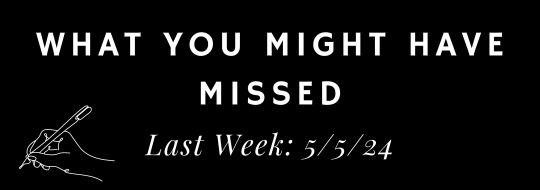
A quick round up of updates on the blog including new characters added to the ASK LIST and a list of fics that went out last week:
New characters were added to the ask list this week:
Sean Archer
Jack Reacher
Jack Hodgson
AJ Chegwidden
Carlton Lassiter
New Fics:
Chicago Med:
The Only One (NSFW) - You're the only woman Sean has been with sober.
Big Heart - How it starts between you and Mitch.
The Morning After - Mitch makes a decision after the two of you spend the night together.
Fuckable - You and Mitch were never just friends.
The Study Part One: Courting Disaster - Dean realises Jack is courting you.
Sleeping Late - You sleep late for the first time in years. (Jimmy Lanik x Reader)
Chicago PD:
Make Me Forget - Antonio is devastated when he catches up with you after the op.
CSI Vegas:
Something About You - Trey has never been able to figure out how he fell in love with you.
The Equalizer:
Watch Me (NSFW) - You want Harry to see everything he does to you.
FBI:
Little Changes - Stuart notices when you start to make little changes.
FBI International:
Live Stream - You recieve a lead on Damian's location.
Ravaged - You find Damian in a bad way.
FBI Most Wanted:
Attention - Remy realises you need a little extra attention.
Fire Country:
Sunday Mornings - Luke takes your advice and carves out some time for himself.
Haven:
Burden - Dwight carries the entire town's burdens on this shoulders.
All Night (NSFW) - Dwight spends the night with you.
Law & Order:
Pushy - Cyrus has forgotten how pushy you are.
How We Met - Nolan reflects on your relationship.
Happy Birthday - Nolan doesn't celebrate his birthday.
Distraction - You distract Nick from work.
Law & Order SVU:
Say My Name - Joe needs to hear you say his name.
Marvel:
The Day We Met - Frank reflects on the path the relationship has taken.
Mayans:
Future Building - Riz builts you a house.
The Musketeers:
Memories - You and Treville have a lot of history.
Duty - Treville is bound by his sense of duty, even at the cost of your life.
Rubies - Aramis spends a momeny alone with you.
Love You More (NSFW) - Athos hates that he loves you.
NCIS:
In The Night Hours - Alden reflects on your relationship and how far you've come
Nothing I Wouldn't Do - There is nothing you wouldn't do for Nick.
NCIS LA:
At His Best - AJ only wants you to have good memories of your time together.
For Better, For Worse - Your sister Sissy causes problems for you Nik.
Numb3rs:
Invaluable - Ian stays the night.
Psych:
Coffee - Carlton knows something wrong from the way you take your coffee that morning.
Reacher:
Not What I Expected - You aren't what Reacher expected.
The Rookie:
Out of Your League - John has always thought you were beautiful.
Scars - John loves you and all your scars.
The Rookie Feds:
Lifetime - Brendon is building a life with someone else.
Climax (NSFW) - You think about Brendon on the day of his wedding.
Silent Witness:
The Backseat - You and Jack have an unusual meet cute.
Cursed - Jack is sure his car is cursed.
SOA:
Worship (NSFW) - Tig worships you in the bedroom.
ATF!Series Part One: A Rabbit You Don't Want To Chase - Stahl makes an unwelcome return to David's life.
Triple Frontier:
Break (NSFW) - Frankie forces you to take a break.
Yellowstone:
Bluebelle - Walker sings you a very important song.
Stop Thinking, Start Listening - Ryan hates seeing you with another man.
#ryan yellowstone#walker yellowstone#tig trager#david hale#frankie morales#john nolan#Brendon acres#Jack hodgson#jack reacher#carlton lassiter#Ian edgerton#vostanik sabatino#aj chegwidden#alden parker#nick torres#captain treville#athos#aramis#frank castle#Michael riz ariza#joe velasco#nick baxter#nolan price#cyrus lupo#trey cahill#stuart scola#antonio dawson#dean archer#mitch ripley#jimmy lanik
23 notes
·
View notes
Text
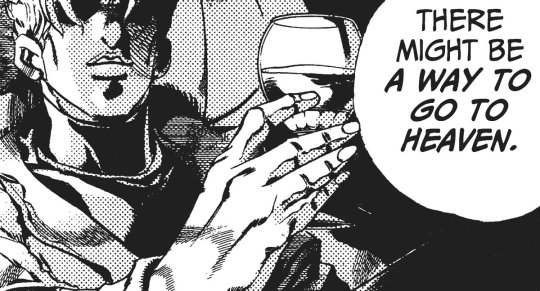
"DIO's Heaven" A jjba world building theory no one asked for that has been TORTURING me for years.
❗❗ SPOILERS FOR PARTS 1-6❗❗

OK LET'S GO "The Heaven pertaining the soul, WHERE it'll go." Tl;dr: Heaven is a place. Here's how:
We know that in the Jojo universe Hell and Heaven are equally talked about as a religious belief. In part 1 young Dio was sure his Father was going to end up in Hell for the atrocities he committed his whole life.

And again, in part 6 Dio specifies that the Heaven he talks about is where the human spirit will go after death. With the introduction of stands, the visual personification of souls, we clearly see this happen multiple times, especially the ascension to Heaven, where they'll finally find peace.
In part 5 we'll also see how, ironically, dying is the only way to escape the chains of Fate. The same Fate that has been object of both oppression AND obsession for Dio since his young age. He believed it was in his Destiny to accomplish his early goals, being Jojo also part of this bigger plan. Of course he was wrong.
Failing to realize how Jojo was the closest person to him (and how attached he was), this dumb man ends up killing him and then regretting the act. I don't wanna go too much in detail about it because we all have read the manga and perfectly know what happens, so, Dio just lost the most important person in his life and had 100 years to overthink about it at the bottom of the sea. Perhaps, taking jojo's body wasn't what Destiny meant for them as "being two that make one" and this dumb dumb can't go back in time. ...or can he? Let's proceed in order
All Dio wants is happiness (relatable, i know) that can only be found in Heaven. Why? We'll see this later, i wanna focus first on how to get there. Because as we said, Heaven is an actual place. But reaching it isn't very easy, especially if you're not dead. Also there's another MAIN issue: Dio isn't human. By rejecting his humanity through the stone mask he basically lost any little chance to ascend to Heaven, because believe it or not: vampires may have a soul, but they're damned. After death there's absolute nothing, no Hell either. Just this:
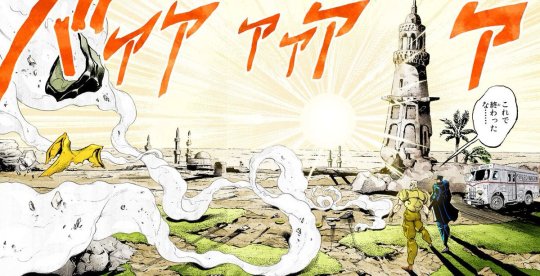
But Dio knew this well. His death was a temporary but necessary phase, he'll write about it in his journal (he simply wasn't expecting it to happen like THAT, sigh) and his plan is safe also thanks to an unexpected gift, a little trinket, that carries his consciousness and dna.
Let's recap Dio's instructions to get to Heaven:
-A trustworthy friend. “He must be someone who is not interested in political power, fame, wealth, or sexual desire, and who chooses the will of God before the law of humans.” I will talk about God a lot as ideal, but even if we have a tangible proof of saints existing in JJBA I still don’t wanna claim God’s existence as certain. We have Dio doubting it himself (“If God exists”) and sure there is a force ruling the events, but I have a quite different view on what this force actually is. Let’s continue;
-His stand, The World, and “courage”. “I must have the courage to destroy my Stand momentarily. As it disintegrates, my Stand will absorb the souls of the 36 sinners and will give birth to something utterly new.” -The souls of 36 humans who have sinned, “because those who havesinned harbor a strong power within.” It is said that we, humankind as a whole, are “sinners who need God’s grace” and that the true distinction between a bad person, worthy of going to Hell, and a good person, worthy of Heaven while being forgiven for their sins, resides in the ability to feel “regret” for their own actions. I believe the sinners being from the Green Dolphin street Prison’s lowest circle was providential: they’re all criminals who voluntarily rejected God, their soul already belongs to Hell. So why? There’s a deep symbolism in this.
The sinners are a reference to Dio’s past identity, the man who rejected humanity in favor of world domination (Actually not just that, but now it’s not the time for an in-depth analysis of Dio’s psyche). Such a person would never reach Heaven, right? Well, the key is in “regret”.
Exactly because Dio regretted his actions attaining Heaven it’s not impossible, just very difficult. We said he was gonna use the souls of sinners, but sinners go in the opposite direction, to Hell. So how is it possible? The trick is in the number: 36 has a double meaning. If we look at it mathematically, the sum of the integers from 1 to 36 is 666, the number of the Beast (and Dio was referred to as the Evil in opposition to the Good, with a name so contrasting to make everything even more interesting). On the other hand, 36 has also very positive meanings: the actual number of texts in Holy Scriptures is 36, it’s said that in every generation there are exactly 36 perfectly righteous people alive (we could easily also call them saints) and the world only continues to exist in their merit as they contain a spark of the Divine Light within them, that same light that first shone for 36 hours after its creation and before being replaced by the Sun… But most importantly, 36 has a meaning of rebirth. It’s two times 18, which carries the meaning of “life” (from the Hebrew letters that spell “chai”, meaning "living") so 36 translates into “two lives”. Thinking about it, it’s exactly what happens through the Green baby: Dio reincarnating as someone new, a new pure lifeform free from his sins, no more damned.
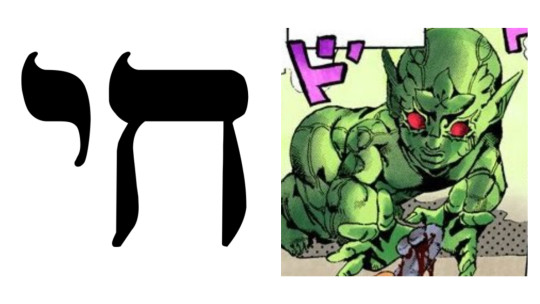
-The cryptic 14 phrases, engraved into The World, so that he couldn’t forget them. I believe these phrases carry Dio’s past but also his Future. Something that after his rebirth would let him not forget where he came from, but also remember where he’s going. Which is why they’re so important and spark a reaction in the Green Baby:
“Whatever is born will "awaken". It will show interest in the 14 words that my trusted friend will utter... My friend will trust me and I will become his "friend".” We’ll witness the first Gravity-induced fusion in the entire series, something that will become more familiar later in Jojolion.
-”Lastly, I need an appropriate location. North latitude, 28 degrees, 24 minutes, West longitude 80 degrees, 36 minutes. Go there and wait for the New Moon. That's when Heaven will come.” AND THIS, RIGHT HERE, IS WHERE WE START. The foundation of how Heaven, Gravity and Fate, Souls and Stands work in the Jojoverse. And also where things start being complicated. The best way to explain everything is starting from Pucci and his role in Dio's plan, then moving back to the first manifestation of Stands. As i said before, in PB the existence of God is in doubt because we don’t have any tangible proof, it's simply an idea sustained by faith. What if i tell you that God, as an actual figure, is actually a product of human actions and everything is governed by Gravity/Fate instead? We know that Dio and Pucci encounter was a product of Gravity, and so was their fusion: there's a reason why he tripped on him, of all people.
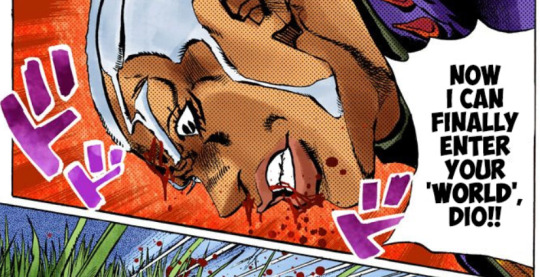

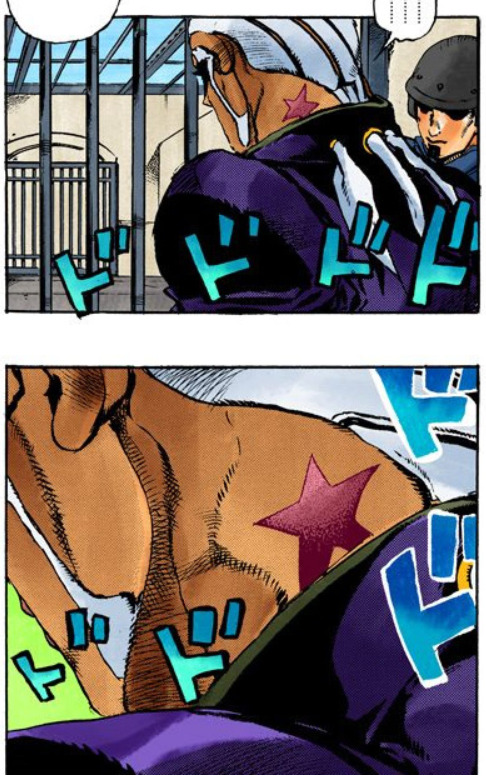
It's exact after this moment, when all left to do is "waiting for Heaven to come" that we get the first actual manifestation of the Divine: the recurrence of number 3.
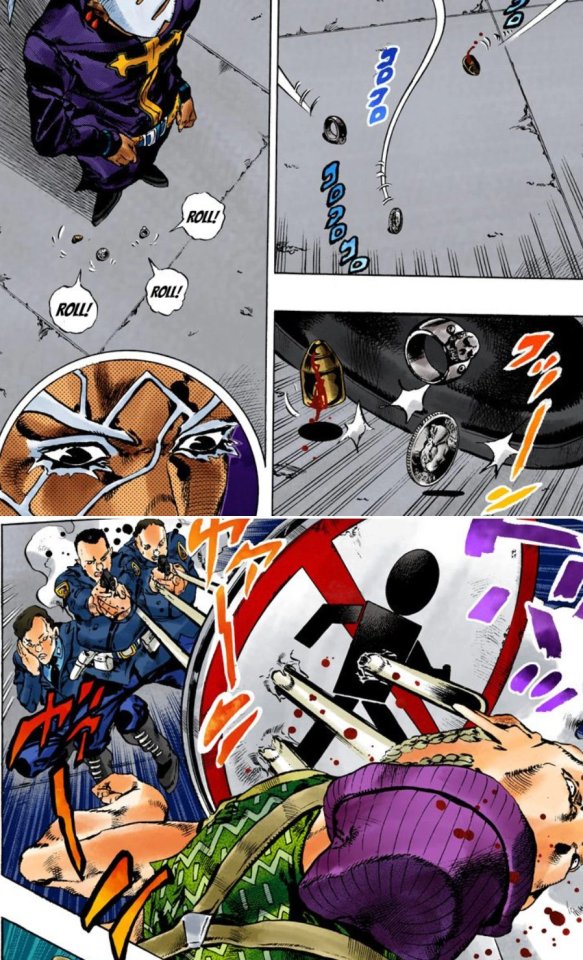



Biblically, the number 3 represents Divine wholeness, completeness and perfection. If there ever was a desire to highlight an idea, thought, event or noteworthy figure for their prominence, the number 3 was used to put a Divine stamp of completion or fullfilment on the subject.
Now i'm not saying that Dio is God or became one (THAT would be interesting and i already valued the possibility some years ago), but seems like in the Jojoverse there's no room for coincidences and everything happens as planned by Destiny, so these 3 people being the sons of Dio and drawn to Pucci are exactly where they were meant to be. If God doesn't exist, this is still the proof of how Dio is getting closer to the ruling force of the Universe: Gravity. And through it, finally find happiness. So, we're waiting for Heaven and we have a very specific place where to go for make it happen. Cape Canaveral: the most optimal place to launch a rocket. But what does this have to do with Heaven? OH, MORE THAN YOU IMAGINE. Because it is a place. But i never said it was on Earth.

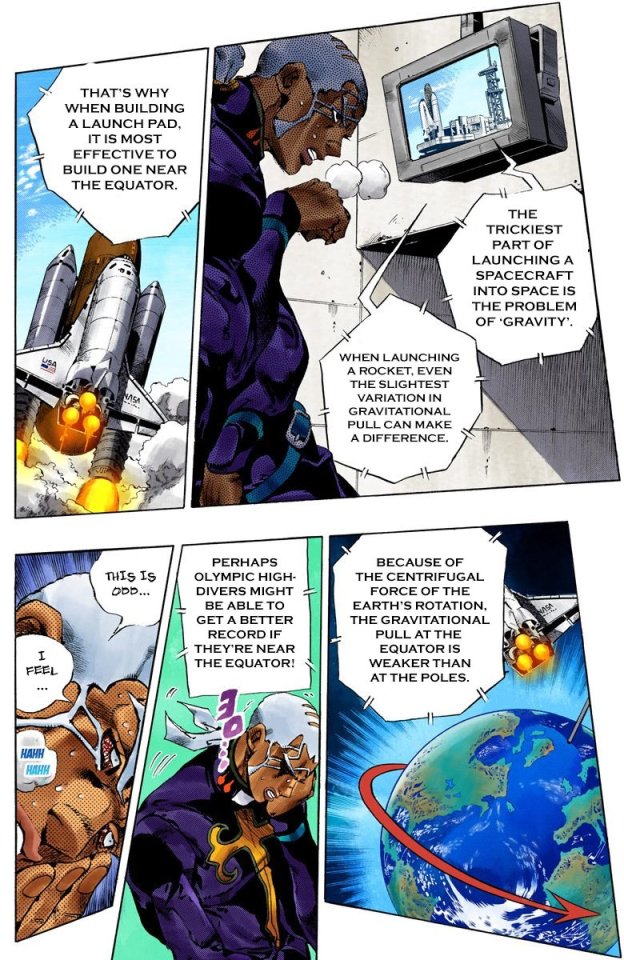
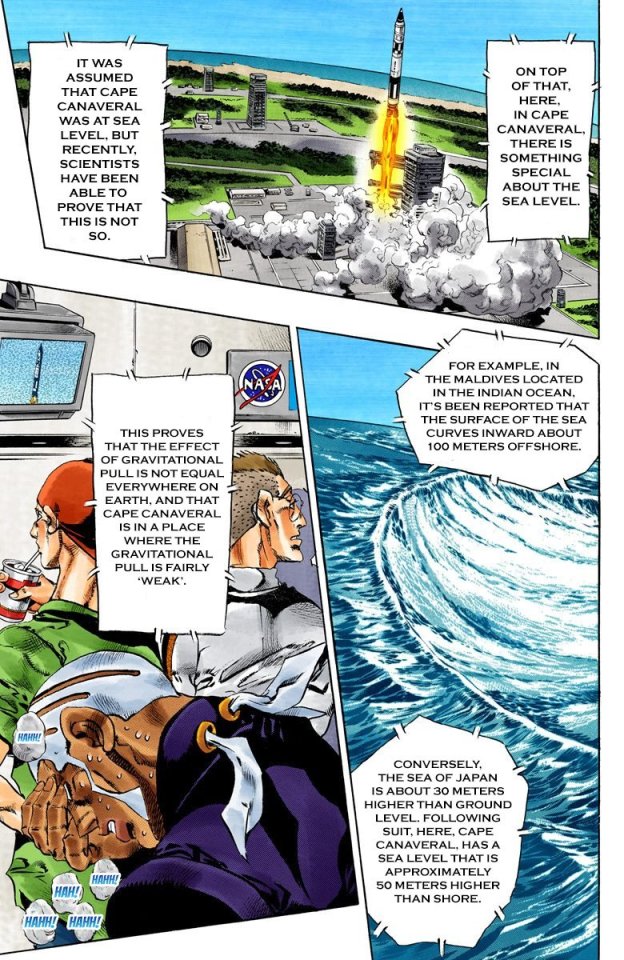
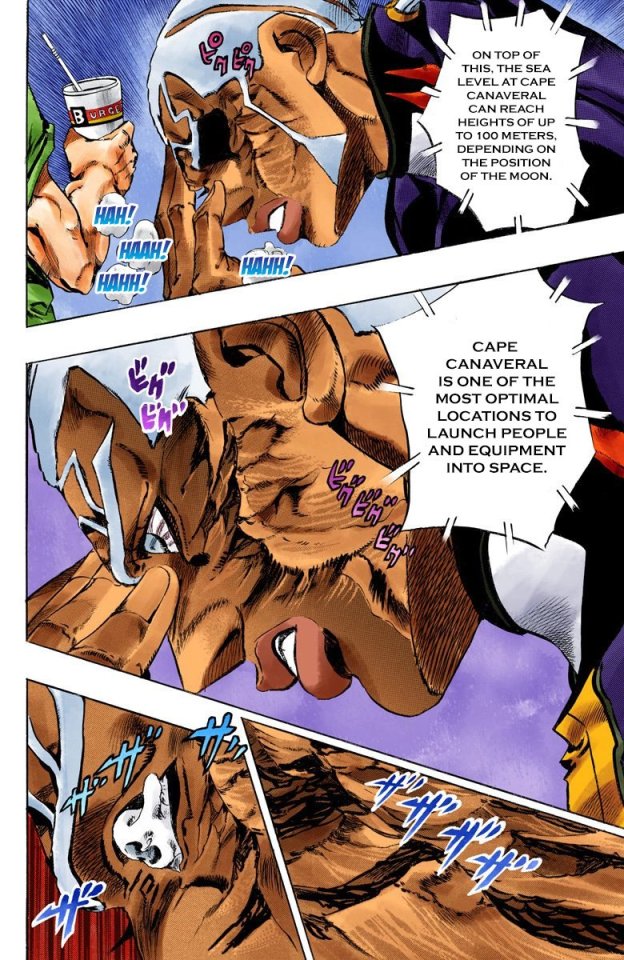
To understand our destination better, i wanna make a step back. Ecclesiastes 12:7 says “and the dust returns to the earth as it was, and the spirit returns to God who gave it.” We said we don’t have real evidence of God, but spirits DO go somewhere. Foo will say it clearly: the spirit/soul can’t stay on Earth for long, with the only exception of a sudden or tragic death, tying them to a specific place. In most cases, they have unfinished business as the deceased person does not accept the way in which they died (like Riemi or Kira and his father). But once this soul is freed, and if they're worthy, they all go in the same direction: up in the sky, welcomed by a very bright light.
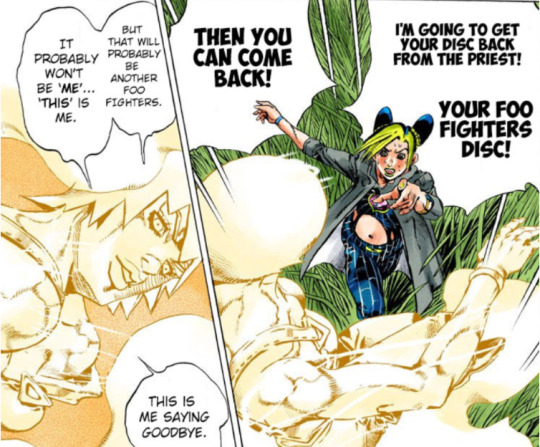

Heaven is often described as the "highest place" and in the Scriptures, in both Hebrew (shamayim) and Greek (ouranos), it can be translated as "sky".
The first line of the Bible also states that Heaven is created along with the creation of the Earth (Genesis 1). SO. We're looking for a VERY bright something in the sky, created post Big Bang and as old as the entire Universe, which is also deeply subject to Gravity. I already have a very clear idea in mind, but let's also drag in the mix what Pucci knows: the World, a stand involved with the manipulation of TIME, was NECESSARY for reaching of the conditions to attain Heaven. Who's that pokemon? It's a Quasar!
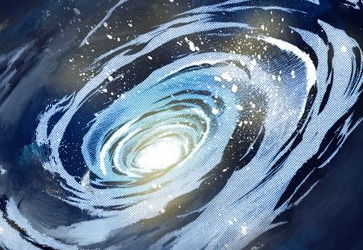

An astronomical object of VERY high luminosity found in the centres of some galaxies and powered by gas spiraling at high velocity into an extremely large black hole. SO IS HEAVEN A QUASAR?!? Ahah no, but there, at its core, that's where our bus ticket is.
Quasars are some of the brightest objects known, able to outshine all the other stars and can be trillions of times brighter than the Sun. They were much more common when the universe was young, must have been able to form after the universe began to expand. But any simple one won't do, no. To find Heaven we must identify the first, oldest quasar in the Universe, which hosts a very peculiar and unique, primordial, supermassive black hole: the gate for true, unfettered happiness. I'll try to make this as simple as possible leaving out every superflous notion or math about general theory of relativity or we'll NEVER be able to get to the point. At the start i hinted to the possibility of going back in time. Yes and no, it's a bit more complicated than just press rewind but Pucci was right, it IS involved with attaining Heaven.
In astronomy, a black hole is a physical location of no return because Gravity is so strong that nothing -not even light- can escape. As you get closer to it, the flow of time slows down progressively to the extreme. From an outside viewpoint it's like time stops.
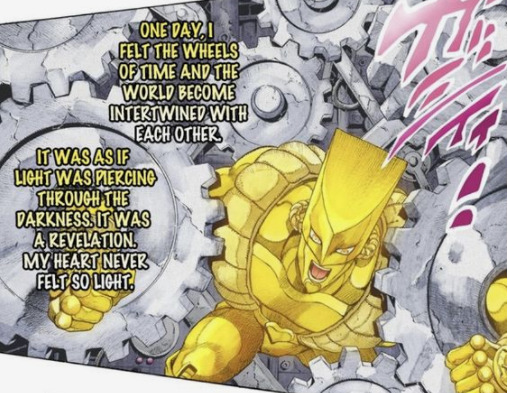
At its center, a black hole is thought to have a singularity point: a location where matter is compressed down to infinity and all conceptions of time and space completely break down. Some even call it "Reverse creation". But as we said, to reach Heaven we seek something way more specific.
As far as we know distant objects are seen as they existed in the past and quasars are the most distant and oldest that astronomers have been able to detect. The most distant quasars are seen at a time when the universe was one tenth its present age, roughly a billion years after the Big Bang. So we're not fully able to find our special primordial black hole, unless we have a way to get closer in a matter of time: Made in Heaven's ability to accelerate time to infinity through gravitational power manipulation will be providential in this. By moving back in time we get to reach and go over the Cosmic Microwave Background, a remnant from an early hot, opaque plasma stage post Big Bang and an evidence of it being the origin of the Universe, the beginning of time. We have zero knowledge of what's behind it as we can't observe it.
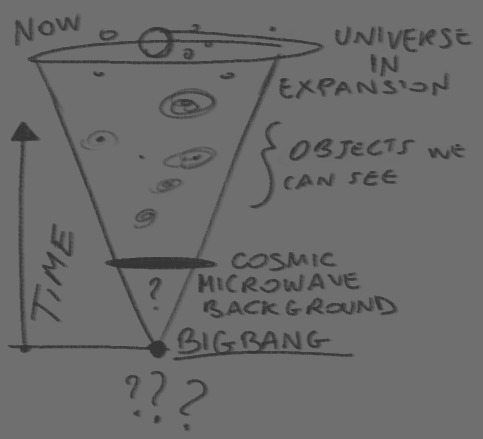
Assuming that Made in Heaven brings us there, what now? In the designed location, moving at infinite speed towards the singularity point of a black hole as old as the Universe itself, and with time SLOWING down once we meet the Singularity point, WHERE are we going? Incredibly, our answer can be found in the Book of the dead. In Ancient Egypt it was believed that the afterlife was a mirror image of life on Earth. Death was only a transition, not a completion, and opened the way to the possibility of eternal happiness. So let's consider this:

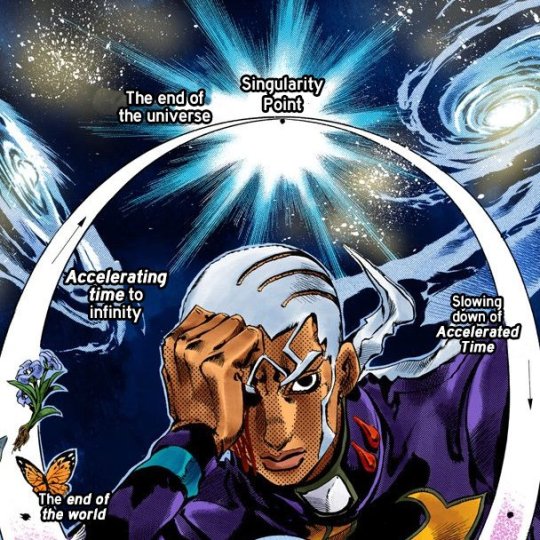
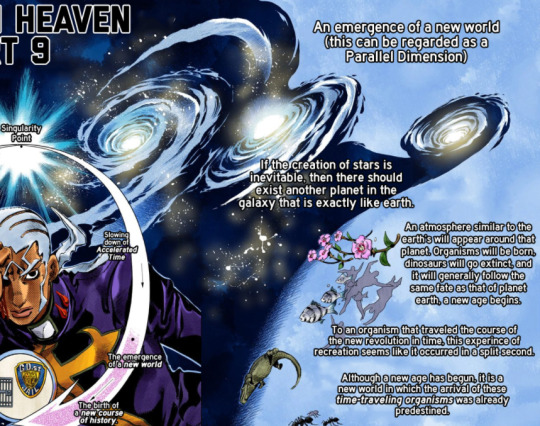
An entire universe behind a black hole, exactly like the one we know, but unaffected by the laws of Gravity as the Fate we know that keeps everyone in chains. Where a soul lives like any their normal life on Earth, but free to act outside any binary AND with the lack of the "Evil" that messed with their previous life, with the promise of a happy otherworldly existence. A chance of rebirth, staying true to yourself, but aware of mistakes you won't commit again. Now if this isn't Heaven i don't know what it is... It makes sense that through Made in Heaven only living organisms could reach such place, as the dead are already subject to the laws of Gravity in their predestined travel to either Hell or Heaven. But things got messed up by Pucci's intentions, as his stand ability is subject to his own belief, desires and psyche.
It is possible that "knowing your future in advace resulting in peace of mind and happiness" belief caused Pucci and Emporio to travel back in the course of Time jumping in a new world where destiny will repeat itself, hence the ability to see the nearest future as vision. And this is anywhere near to what truly Heaven is supposed to be. Happiness won't come from reviving your life exactly like it was (in fact the sole differences we spot are due the people that were already dead being replaced by their own version belonging to that world) but as we said it's the act of being FREE from the laws of Gravity. I believe this shift of intention is what caused Pucci's demise and Emporio's travel to a secondary parallel universe, hinting the existence of a multiverse where every world is connected to the others through the numerous black holes that reside in them. But neither of them would lead to the afterlife except for one. How much does this complicate things? Very.

Probably if Dio and Pucci were able to spend more time together, with Dio explaining better his view and belief, nothing of the canon timeline since before Pucci's death (his death included) would ever happen and everyone would be living their best life in Heaven. Or even better, if Dio were able to realize his plan before the events of part 3... (all the pain of SDC... gone, never existed. Sigh.)
Identifying Heaven as an Universe (including space and time, planets, stars, galaxies, all the forms of matter, energy, the souls of every creature and humanity) makes everything extremely interesting when we look at how the Jojoverse works.
Given that the gate for Heaven is a Quasar, it's known that sometimes they shoot out pairs of straight jets, containing matter moving close to the speed of light in a tight beam, to distances far beyond the galaxies they live in: how does this affect the worlds these beams reach?
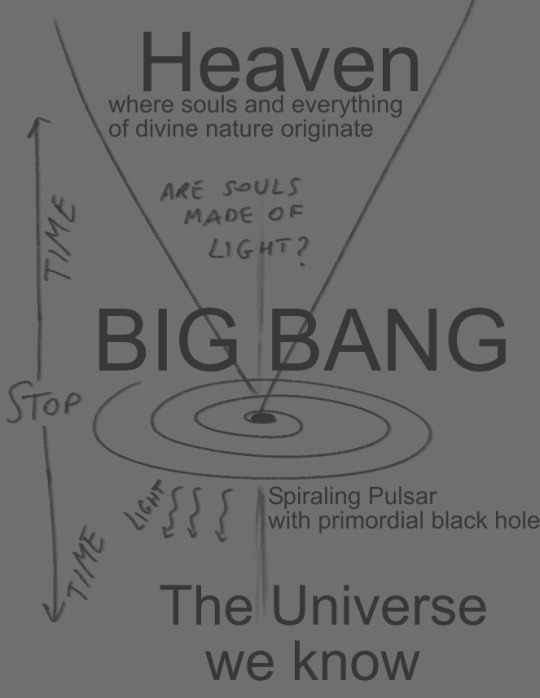
For a start, we can assume that with Creation every living creature is born with a soul, that is shaped after the individual's choices, experience and psyche. In various religions it's attribuited to the Divine spark gifted by Gods. The references to light are so many that is difficult to call them a coincidence in a setting where "coincidence" isn't really something possible with Gravity's laws. Back to our matter escaped from Heaven, if it were to get in touch with a normal soul, we'd probably have an evolution reaction: natural born stand users.
I believe that the particles coming from Heaven, engaging with the soul that originated there, would trigger a violent reaction shaping the original soul into something more complex (and i would say dormant) that always belonged to the user. We'll learn with part 3 that not everyone has the spiritual strenght to bear this evolution, like when stands are induced later on. So are stand arrows involved too? The answer might surprise you.
Let's take a step back and move to the Poles, approximately 50k years ago, when a meteorite crash-landed on Earth around Cape York, Greenland and later on, in that same site, a misterious disease was found, leading to the creation of stand arrows 2to acquire the powers of Gods".
The fact everything happened at the poles is very relevant to this theory, especially a certain discovery. Let me introduce you to Neutrinos: a subatomic particle that is very similar to an electron, but has no electrical charge and a very small mass, it was almost believed they didn't have any at all. There are different types of neutrinos and they're the most abundant particles in the Universe, although very difficult to detect too. It is possible that a large fraction of the dark matter of the universe consists of primordial, Big Bang neutrinos.
The type that is relevant to us is high-energy cosmic neutrinos that are born in the CENTER of quasars, expulsed by jets and able to cross the Universe without interacting with matter and without any delays on their way. But at the Pole was found a particle that "shouldn't exist" shooting straight up out of the ice and seems to move straight back in direction of the quasar that originated it. Some scientists dared to call it "a ghost particle". Let's add this up to the evolution of the soul, the rules of Gravity and the guys that wanted to gain the power of a God: if the metallic material of the meteorite, infused with the ghost particle, were to come in contact with the organism where the souls resides... Did i already mention that they interact through Gravity?
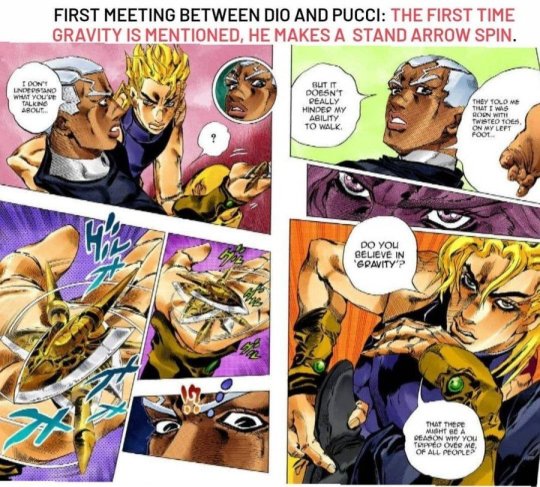
Lastly, this whole system would give us a reasonable explanation for certain stand abilities, like Vanilla Ice's and Okuyasu's (being possibly connected to a black hole's singularity point, allowing them to destroy the matter they absorb with no turning back) or others, seen afterwards, capable to move objects or people through different dimensions and/or parallel worlds. Lastly, i wanna spend two words regarding Dio's resolve and why i firmly believe that he regretted his actions. Dio's a person who tends to live a lot in the past and lets it influence his future. I don't think though that his search for Happiness was meant for the whole humanity, like Pucci tried to achieve. Dio's wish was more selfish and limited to himself, perhaps to his trustworthy friend too, but nothing more. He sacrificed himself for something once, that didn't lead him to happyness as he might have thought at the start of Phantom Blood, but is ready to give up on everything a second time with no hesitation. No feelings of grandiosity or power, he recognized his mistakes and wanted to restart everything once again.

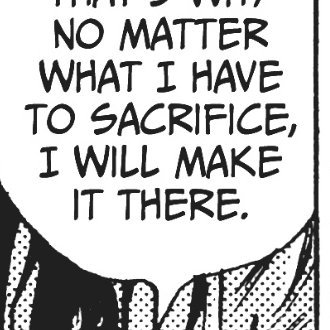
And maybe living a normal life for once. Who knows, maybe letting people be close to him without paranoid tendencies too... True, unfettered happines probably lies in the simplicity of conducting your life following your own decisions, and not Fate's. Or your abusive father's.
So this is Heaven. I know it's long, delirious at some traits and all, but i thought these corrispondences were neat and worth of being shared. So if you got till here and enjoyed it, thank you for your time!
#dio brando#dio jjba#Dio's heaven#Heaven jjba#Jjba#jojos bizarre adventure#manga theory#mothtalks#stone ocean#enrico pucci
60 notes
·
View notes
Text
was reading recently about the "to be lawful or good" trope (follow orders/respect rule of law, or do what's right?), and it occurred to me that western values are so idealistic on the matter that "good" is almost always chosen, and a character who believes the law is the greater good is usually painted as morally dubious and hypocritical. tvtropes points out that in the parallel "to be chaotic or good" dilemmas protagonists almost always choose chaotic. i guess that makes sense from the point of view of fiction as wish fulfillment, and the ideal world for an american is one where they can do whatever they want without consequences.
psycho-pass is a really good example of media where this does not happen. anime in general tends to be more respectful of "lawful" values, sometimes to excess from my own western point of view (too many anime i've seen, workplace abuse is "dealt" with by learning to work harder). but urobuchi at least has a nice concept of what a balance can look like. (spoilers below, of course).
akane tsunemori is the most lawful good character to ever lawful good. she has constant positive intentions, cares for everyone in her society, and does so by enforcing and interpreting the law - and would not have it any other way. there's an amazing quote from her near the end of s1 (i have not seen the later seasons):
"People have always detested evil and sought out a righteous way of living. Their feelings, the accumulation of those peoples feelings are the law. They’re neither the provisions, nor the system. They’re the fragile and irreplaceable feelings that everyone carries in their hearts."
when faced with "to be lawful or good", she never once gives up on the law, no matter what. she has at least two chances to kill a dangerous villain outright and rejects both as being against orders; when the law itself tries to ensnare someone she loves, she finds a way out by following the rules instead of just breaking them like any other hero would.
dungeons and dragons kind of threw the alignment system at players and told them "you, there, interpret this". it's difficult and a lot to ask. from the little experience i have with it, most players only care about good/neutral/evil, and as for law vs. chaos they're just treated like different flavors of ice cream. it's far more compelling to treat them as equally important - a lawful good character and a chaotic good character are as far apart, morally, as a lawful good and a lawful evil one.
psycho-pass s1 doesn't have a chaotic good character. the closest it gets is kagari, who could perhaps be called chaotic neutral (though i have trouble calling any literal cop chaotic, he was essentially forced into the role). but it does have a fantastic example of a chaotic vs. lawful conflict, just on the evil side - makishima vs. sibyl.
i think where i wanted to go with this is that part of maturity is learning that two people, or groups of people, who are fighting, may very well both be righteous, and talking it out is often not a solution. i think most modern politics is like this, but that's just my feeling. there are some fairly evil people around, to be sure, but the vast majority of people are not - and recognizing that those different from you are in some ways righteous, and that you yourself are in some ways capable of evil - is really a critical sort of humility.
i might be a little too thrilled with myself for having realized this so early - i was the only kid in my class who liked "lord of the flies", and i still do like it. tumblr used to really have a thing about hating it back when the audience on this website had an average age of 16. i hope those people who insisted "but i'd never have grown up to do anything bad" have learned better since. but looking at how many older people (including apparently most writers) haven't gotten the memo, i'm not too sure.
#yet again i'm posting thoughts that i starting having a decade ago#psycho-pass#akane tsunemori#moral relativism#long post
11 notes
·
View notes
Text
Unhappy Campers: an Honest Review
I’ve been impatiently waiting for this episode all day. I even spent the last two hours before it premiered constantly refreshing YouTube to see if it had already dropped, so it’s fair to say I was very excited for this episode thanks to the sneak peeks we’ve been getting over the months. On the one hand, because it promised to introduce Barbie Wire into the show at last, and on the other hand, because it promised more Millie screentime as well.
And while it definitely delivered on both things, I can’t help but feel Unhappy Campers is actually one of the weakest episodes of the show. Or at least of season 2.
My main problem with the episode is that the conflict feels rather forced to me. Not the Blitzo/Barbie Wire conflict, since at this point Blitzo’s sister hating him despite how much he seems to genuinely love her and care for her is pretty much on brand with this show and his character, but the M&M conflict.
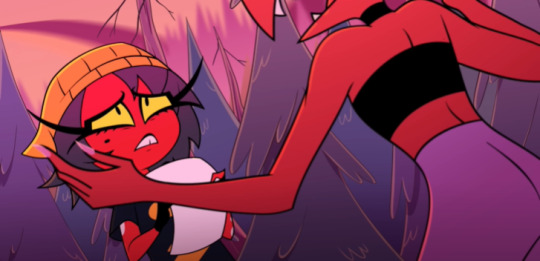
It just feels like it comes completely out of nowhere, you know? Like it just doesn’t add up with the rest of the show. At least, compared to Moxxie and Millie’s characters and interactions in every other episode.
You could say my main problem is that what goes down during the episode would work if this were a separate episode, completely unrelated to the rest of the season, sort of like Queen Bee. But the thing is, it’s not supposed to be its own thing, it’s supposed to be connected to the rest of the story, so it ends up feeling very incoherent with what we’ve been seeing so far.
It’s obvious from the very beginning that Moxxie is going through an Acquired Situational Narcissism moment as a result of this being his first case where he gets to lead, meaning he expects everything to go his way just because he gets to be in charge. Everything Moxxie does in this episode is a desperate attempt to reflect how important he is feeling at the moment, instead of taking the best, most practical course of action.
That is to say, listening to Millie and take care of the murderous teenager who’s clearly very bad at keeping a low profile.
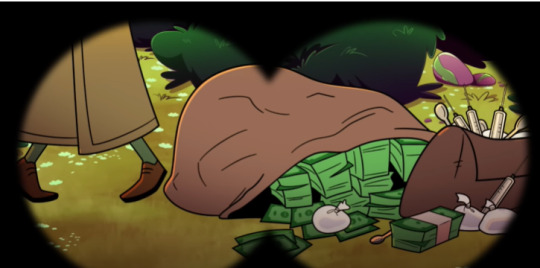
This goes from his Moxxine persona, a typical Alpha Bitch type who would have everyone wrapped around her finger...
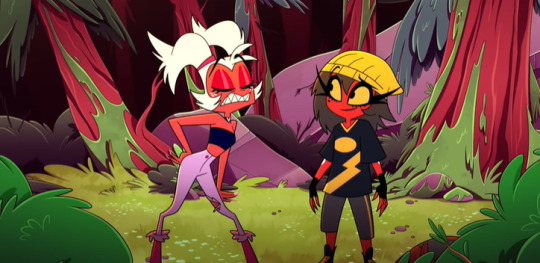
...to trying very hard to win everyone at camp...
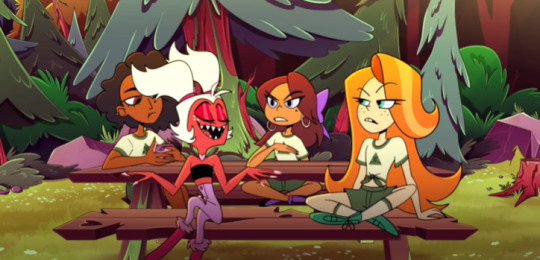
...especially by presenting himself as better than everyone else in order to become popular.
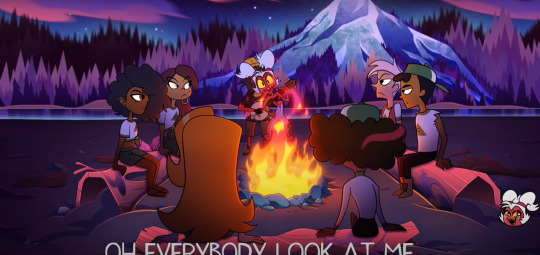
Only to fail miserably because these kids for once aren’t your stereotypical sheep looking for a mean-spirited leader to follow. No, they aren’t impressed by a fake attitude coupled with a presumptuous confidence and thinly masked condescension, but by actual talent and charisma.
And who happens to have that?
Millie, or Millerd, in this case.

So while Moxxie’s trying desperately to get these kids to like him and become popular, Millie is achieving just that effortlessly, while making her husband increasingly envious of her popularity at the same time.
Now, this in itself isn’t a bad premise. Most shows have at least one instance where one of the main characters is more well-liked than the other, who becomes frightenly jealous and petty as a result. In fact, this would work if it had happened between Blitzo and Moxxie, for example.
But it’s the fact that Moxxie is feeling jealous of Millie, his wife, that to me this sort of feels like it comes out of left field.
Basically because so far Moxxie and Millie’s marriage has been nothing but perfectly harmonious and equally loving and supportive. Moxxie has always been Millie’s #1 fan and supporter, so I find it a bit hard to believe the same guy who stood up to his intimidating in-laws because they were unfairly reprimanding his wife for a mistake on their part would now grow jealous and petty over others appreciating her many talents.
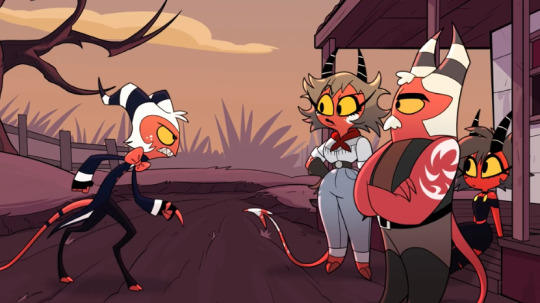
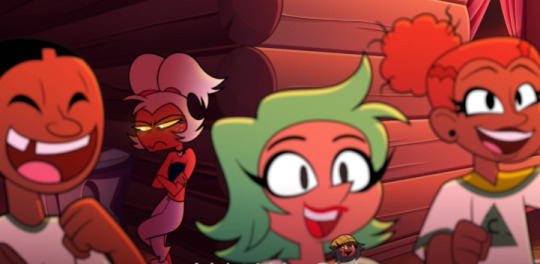
No matter where you look at it, this is just entirely out of character of Moxxie. Not only because he would never be so resentful of the love of his life, but because Moxxie just isn’t this self-centred. Even when he was struggling to keep up with Striker in The Harvest Moon Festival, it was only because Striker and Millie’s family kept looking down on him and he wanted to prove himself. It was never a matter of stroking his own ego.
And then, there’s Millie’s side on the matter.
As I said, it’s great that we had some more Millie screentime and that she expressed needs and wants of her own for once, but the problem is, I personally feel like they come out of nowhere and fail to properly connect with anything that’s already been established.
Millie says she feels like she’s important and someone to be proud of for once, which hints at some deeper insecurities that are worth being explored. Unfortunately, these insecurities are being introduced now, after a season and a half, so there isn’t really much that would make us understand her outburst here. In my opinion, it almost feels as if Millie’s character has been so perfectly content with her life overall, never showing signs of having any kind of issue of her own, that now that they need some drama, the writers just have no idea what to do with her in order to achive that. It’s like they’re now adding toppings on an already cooked pizza, if you know what I mean.
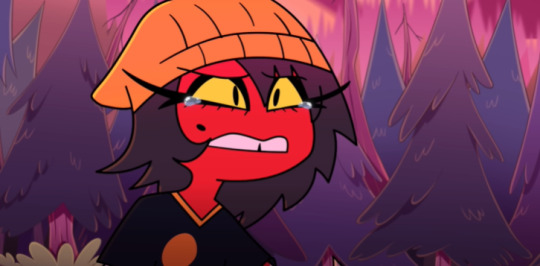
And the funny part is, this is actualy easily salvageable!
Literally all it would take to make this more coherent and better woven with the rest of story would be to link Millie’s outburst to her family life. No need to suddenly turn Joe and Lynn into abusive parents, because we have enough of that already, but they could have played with what they already had.
While the episode itself didn’t dwell on it, as it was a Moxxie episode, Millie’s interactions with her parents and Sallie May hint at some sort of favouritism towards the latter because she is a better assassin--in the sense that Sallie May at least doesn’t seem to get carried away with her killing and is smart enough to hide the bodies of her victims. Also, in their parents’ eyes, her life in the farm is more stable than Millie’s job as a free-lance, which they don’t even understand how it works.

Joe and Lynn are very set on their ways regarding how people should be killed: with your bare hands or using melee weapons, you can’t be sloppy and let your guard down, be smart about it... Qualities Millie doesn’t follow one way or another: her husband isn’t physically strong and prefers guns, she lets her emotions get in the way and hinder her kills, she forgot to cover up nine deaths in the last Pain Games she participated in...
Really, all it would have taken to fix her feelings on the matter coming practically out of nowhere would have been a little mention to her home life and how she feels she never measured up to her parents’ expectations of her and now she’s finally being validated for being who she is.
Instead, we’re left with an episode whose premise only makes sense as a stand-alone or with a different set of characters and where the only cohesive thing is another person from Blitzo’s past hating his guts.
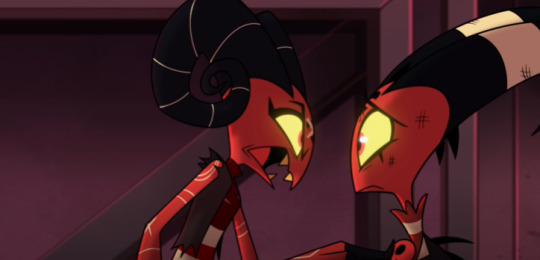
Anyway, this is just my opinion and everyone is entitled to their own. I don’t know if I’m alone on this one. Thanks for taking the time to read this nonetheless.
#helluva boss#helluva boss spoilers#helluva boss season 2#unhappy campers#helluva boss analysis#helluva boss moxxie#helluva moxxie#moxxie#helluva millie#helluva boss millie#Millie#m&m#helluva boss blitzo#helluva blitzo#blitzo#barbie wire#vivziepop#vivziemind#vivienne medrano
104 notes
·
View notes
Note
what if i was ranger Will and you were a rouge bandit and we got into a fist fight and we accidentally kissed, what then.
Wow anon where did you get the idea for that.... sound very cool... what if you were Ranger Will and I was a rouge bandit that got punched by you and then fell in love with you... wow...
Alright to explain, check out this post where @rangercorpstherapy was kind enough to mention me in a discussion about whether Will could ever remarry/find love again or not. TLDR yes he could and ideally I'd want to see him get a boyfriend.
Now, Flanagan sure as hell isn't writing that boyfriend, so I wrote that boyfriend.
On a vigilante-esque mission where Will is more disconnected from the corps and isn't fully following orders, he steals something important from a bandit camp. While leaving the camp though his luck runs out and he gets spotted. Luckily for him he is Will Treaty so he starts storming his way out with no major casualties, when he is about to escape though one last bandit stands in his way. Noticing the guy's unbalanced and nervous stance Will doesn't even slow down and throws a swift punch which is more than enough to knock the bandit over and makes his escape.
That bandit is Andre. The problem is Andre is very, very gay and has a thing for men stronger than him. That combined with the small glimpse he got of Will's handsome face is enough to leave him breathless. The breathless thing might also be from the punch idk.
Andre isn't in a good position in the bandit camp, he is a newcomer and got placed on guard duty because he was seen as the bottom of the barrel. Even though everyone else had an equal part in being unable to stop Will, Andre knows he will get a lot of shit for it especially so he decides to leave. And where to go better than after Will, who is not only Andre's type but also the strategically best option against the bandits who won't take kindly to him running off.
So, he follows after Will while the track is still hot. If it weren't for Andre immediately going after Will he would never be able to track him down and he still gets lost anyway. But even if it takes him days he manages to not fall too behind and eventually catches up with him. He gets hit, again, because Will can recognize him as one of the bandits. But Andre explains himself and they start travelling together.
I mentioned Will being more disconnected from the Corps on purpose because this sets up his and Andre's dynamic very well. Even though Andre wasn't very valued in his last group, he is a good fighter who can hold his own and he is a useful travelling companion to Will. Not only that, Andre doesn't care about laws and he is more than willing to get his hands dirty. He is a good man at heart but morality wise he is very much gray and while Will himself is doing questionable things, Andre indulges this side of him and allows Will to do some things without feeling as guilty about them.
Meanwhile, Andre has a genuinely good man at his side after years of having to work with scummy people, and he feels respected in their dynamic. He likes falling into the role of "the right hand man" around Will and his crush is just getting stronger and stronger.
At the end of whatever journey they've been on the two have gotten genuinely very close to one another and Will has developed some feelings for Andre in return. Their relationship isn't fully healthy though, Andre looks up to Will a lot and even though he wouldn't admit it Will enjoys feeling worshipped. Not only that, Andre also encourages some of Will's worst traits and Will lets Andre slip into the role of the follower without encouraging him to think for himself. Obviously these are things they slowly work out in the future (without getting rid of all of it because that's just boring lmao)
But the idea of a new relationship is scary to Will because of a lot of reasons so he stays quiet even though he can tell Andre likes him.
I have this small comic idea that explores themes of having a new partner/realizing you're queer with a hint of how being on the aro spectrum looks like and it's genuinely very dear to my heart. I'll finish it one day but I'm showing it so you can get a better idea of why their relationship works.
(YES THIS IS HOW ALL OF MY FIRST SKETCHES LOOK)
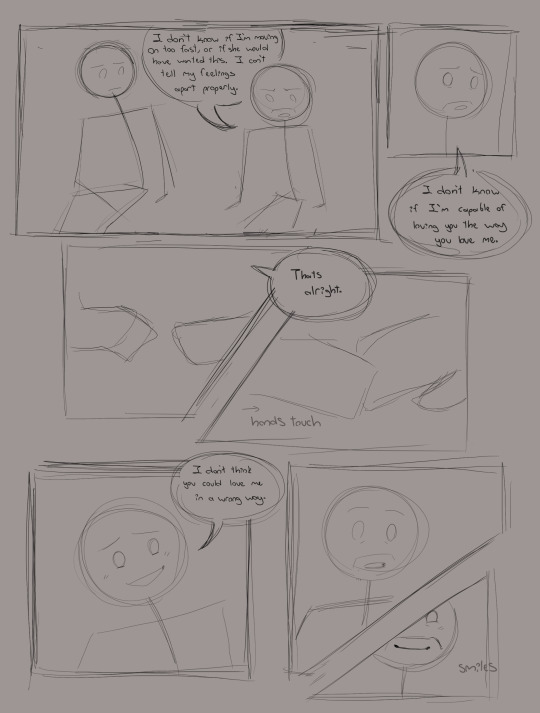
I'm not planning on doing anything with this story other than finishing the comic above since these are silly little scenarios I enjoy in my head and not that serious. But hey, if you've ever wanted Will to be more morally gray and for him to have a boyfriend, here is my story for that.
21 notes
·
View notes
Text
The Self as a Whole: Anti-Participation
( Previous | Next )
Index
Vooters hate me, so hate read!
When it comes to the idea of voting, there are many stances on what to do. Some believe that "it's going to happen anyway" is justification enough to join in, follow the crowd. Others, such as myself, believe voting to be a waste of time and effort. These can all be broken down into various participatory decisions. There are three types of participatory decisions: participation, non-participation, and anti-participation. Two active, one passive. Among these, participation is the most egregious.
Participation is simply doing as is expected, it's going out and voting regardless of how righteous or dirty this makes one feel. Choosing to participate in systems of violence and oppression is to choose to uphold its legitimacy, to give it power and importance. The participant may view their participation as a form of activism against the system they actively participate in, but this is not the case. How are you resisting the military by becoming a soldier, taking orders to murder the innocent? How are you resisting the police by becoming an officer, enforcing unjust laws? How are you resisting the political machine by voting, putting your support behind yet another oligarch? The idea that participation is activism is as nonsensical as saying compliance is resistance.
Non-participation is the default state, it's the act of doing nothing at all. Everyone is non-participatory until their decision is made. The danger in non-participation is in non-resistance. Ever the passive party, the perpetual non-participant is a danger to himself, doing nothing to prevent or resist the evils that be. In non-participation, they are whole at the whims of those who are willing to act one way or another. The more non-participants within a society, the more likely there is for a ruling class to strip them of all that would make them free men. At least the participant may slow the tides of authoritarianism in their misguided legitimizing of the State's authority.
Anti-participation is assumed, falsely, by participants to be equal to non-participation. But anti-participation is not passive. Instead, it's taking an active role in resistance of authority. Anti-participants reject the very notion of statist democracy or any other government system of voting. The State is illegitimate, it will not willingly give up its power (that is, the sum of its rulership). Should something threaten its power, it's agents will fight tooth and nail to ensure that it will not succeed. So long as it's under the rules of the system, the system has power over it. Anti-participants see this - and we reject its authority, reject the idea of enforcing one's will over another, reject their existence.
Anti-participation comes in the form of activism - engaging in lifestyles that are counter to statist control and advocating for a turn away from both participation and non-participation. In this way, it is congruent with counter-economics. The anti-participant is considered by some to be engaging in election interference - and, in a sense, they are correct. In the legal sense, anti-participatory action can be election interference or not be, both being equally acceptable but not equally encouraged. Simply encouraging others to not vote isn't legally election interference and it is the safest route to turn to. For those anti-participants with the means to, and accepting the risks that come with it, they may engage in election interference through the spreading misinformation or the altering or forging of voting documents. Both directions are equally anti-participatory, but they are not equal in risk.
One place in which anti-participatory action is always a risk, alongside non-participation, is in such places where voting is mandatory. Within these nations, such as Australia, anti-participation takes on an even greater abolitionist approach. Risking both fines and jail time, these anti-participants find themselves facing down the barrel of the State's proverbial gun. The position against voting here extends even more into statist minded individuals with the understanding of the rights violations inherent in forced participation. Some might take even more drastic approaches in ways that prevent others from voting. Those that only seek to be given the choice to vote are only allies up until the point they are allowed the choice. Beyond that point, they fall squarely into either the participant or non-participant camps.
I am an anti-participant. I am anti-voting on the grounds that no one, not even a majority, has the right to dictate the lives of others. My position is to encourage others to anti-participatory as well. Not only that, but encourage them to realize their own potentials as free beings, capable of reason and self questioning. I encourage them to the agora, to reject the State's authority and build a society counter to its violence. Such acts of rejection and self-sufficiency are antithetical to participation.
#anarchism#anarchy#market anarchism#agorism#agora#the self as a whole#participation#participant#non-participation#non-participant#anti-participation#anti-participant#anti voting#anti state#voting#vote#vote blue#vote democrat#please vote#vote red#vote republican#get out the vote
3 notes
·
View notes
Text
sexual tension:
accepting / not accepting
@immxvable as nolan price said "it would be a shame to waste such a perfect opportunity."

"perfect, huh?"
she's taunting him; the moment is indeed perfect, and she knows it as well as he does. not only are they forced to share the same hotel room in atlanta, but it is just the two of them for a whole weekend -- and their morning meeting tomorrow was just moved to the afternoon.
it is as perfect as an opportunity could ever be, and they would be idiots if they spent the evening doing anything but fill their stomachs with expensive room service and have enough sex to sweat through the ivory cotton sheets.
she just can't quite help but to push. never too far, never so much that nolan truly loses his patience with her or starts worrying that she doesn't want it -- never so bad that he can question her irrefutable and enthusiastic consent.
just enough that he manhandles her a little bit.
she drops her bag by the end of the queen bed, starting a deliberately slow movement down the line of buttons on her top, and when the blouse falls to the floor she wastes no time falling on her back on the bed. "prove it."
#it matters to me ; writing#to tell the truth ; answered#keep away from children ; mature#two equally important parts ; law and order#i do what i have to ; sam#full of admiration ; nolan#immxvable
0 notes
Text
Bird vs Lion (Javert vs Valjean)
I've been wanting to annotate this scene for ages, because it's SUCH a good example of a really loud Lion primary (Valjean) and a really loud Bird primary (Javert) just being... unable to communicate. And since everyone is reading Les Mis right now, I thought this would be a good time.
So. Inspector Javert has just arrested Fantine, who has insulted Valjean (in the guise of Mayor Madeleine) on her way into custody.
***
“Sergeant!” [Javert] shouted. “Can’t you see this hussy [Fantine] is making off! Who told you not to let her go?”
“I did,” said Madeleine. (...)
It was obvious that Javert had been ‘knocked through a loop,’ as they say, to have allowed himself to say what he did to the sergeant after the mayor’s invitation to set Fantine free (...) Had he wound up telling himself that it was not possible for any person of authority to have given such an order and that Monsieur le maire must certainly have said one thing when he meant another altogether? Or else… did he tell himself that it was necessary to resort to extreme measures… and that, in this dire extremity, law and order, morality, governance, society as a whole, were personified in himself, Javert?
Whatever the case, when Monsieur Madeleine let out that “I did” we heard a moment ago, the inspector of the police was seen to turn towards Monsieur le maire, pale, cold, his lips blue, his eyes desperate, his whole body shaking with a barely perceptible tremor, and he was heard to say something unprecedented: “Monsieur le maire, that can’t be done.”
Poor Javert is having two equally important parts of his system collide here. ‘Respect all authority figures’ and ‘punish all criminals.’ In this moment, he can’t find a way to do both simultaneously, and it’s sort of breaking his brain.
“How’s that?” said Monsieur Madeleine.
Madeleine (Valjean) does not get what his problem is.
“This wretched woman insulted a gentleman.”
She broke the Law! (Objectively true.)
“Inspector Javert,” Monsieur Madeleine replied in a calm, conciliatory tone, “listen. You are an honest man, so I don’t mind spelling things out clearly for you. It’s like this. I happened to be crossing the square as you were carting this woman away. There were still people milling around, I asked a few questions and I found out the truth: it is the gentleman that was in the wrong, and if the police were doing their job, he should have been arrested.”
The lady only technically broke the law, for understandable reasons.
She broke the Law!!!!!!!!!
Javert could not stop himself: “This miserable creature just insulted Monsieur le maire.”
She insulted you, the mayor, a symbol of authority. It is a VERY important part of my system that authority figures need to be respected for society to function.
“That’s my business,” said Monsieur Madeleine. “My insult is mine, if you like. I can do what I like with it.”
I’m not personally upset about it, I don’t see why you care.
“I beg Monsieur le maire’s pardon. The insult is not his, it belongs to the system of justice.”
She must be made an example of. People can NOT be allowed to get away with this, especially not to a symbol of authority/structure/governance. No matter how much you PERSONALLY may not be bothered by this specific incident, she MUST be made an example of or others will follow suit and the morals of society begin to crumble. How can you, a man such as yourself, not understand this? You sir. The mayor who has done so much for this town and whom I respect for both his accomplishments and authority? Do my eyes and ears betray me? Surely they must?"
“Inspector Javert,” replied Monsieur Madeleine, “the highest form of justice is one’s own conscience. I’ve heard the woman out. I know what I’m doing.”
EXCUSE ME? What? No. Why would you think that? That's not how any of this works.
“And I, Monsieur le maire, don’t know what I am seeing.”
*brain is broken*
“Then make due with obeying.”
I don’t know what your deal is. Do you need direct orders to respond to or something? (Valjean is very Badger secondary, you can see it start to kick into gear here, he’s trying to find ANY way to communicate with Javert.)
“I’m obeying my duty. My duty tells me that this woman should do six months behind bars.”
I am REMINDING you of the law, which you ALSO have a responsibility to.
Monsieur Madeleine responded gently: “Listen to me carefully. She will not do a single day.”
… I feel that the law is wrong.
At these decisive words, Javert risked a glare at the mayor and said to him, though in a tone of voice that was still scrupulously respectful:
because you still must RESPECT AUTHORITY
“It causes me despair to go against Monsieur le maire, this is the first time in my life, but he will deign to permit me to observe to him that I am within the bounds of my responsibilities. I will confine myself, since Monsieur le maire wishes it, to the case of the citizen in question.
He's changing the way he perceives Valjean in that quick, dramatic way Birds do. The Mayor is SUPPOSED to be on the side of Law, just like Javert... but has let him down. And Javert (under stress) is just going to get even more icy and even more polite.
Valjean (under stress) gets angry.
“I was there. This girl threw herself at Monsieur Bamatabois, who is a voter and the owner of a magnificent house with a balcony on the corner of the esplanade, three stories, all in hewn stone. At the end of the day, some things count for something in this world.”
We’re starting to get more of a sense of Javert’s system here. People have roles/symbols/functions in society, which must be respected if society is to stay intact. (Also, Victor Hugo was obsessed with architecture, and you can tell that he’s a Bird primary who… absolutely identified with Javert, which is honestly probably why he comes down so hard on Javert in the text.)
“Anyhow, Monsieur le maire, this matter is a case for the street patrol and so it concerns me, and I am holding this woman, Fantine.”
The structures that I believe in say that this situation is the responsibility of the Law. Stop getting in the way of my duty to enact this vital societal function. (I respect you a whole lot less than I did five minutes ago.)
At these words Monsieur Madeline folded his arms and said in a harsh voice that no one in town had ever yet heard: “The case you are talking about is a matter for the municipal police. By the terms of articles nine, fifteen, and sixty-six of the code of criminal law, I am the judge of it. I order this woman to be set free.”
Oh screw you. If you want letter of the law I will GIVE you letter of the law. (This is one of the places where aggressive Bird secondary model Valjean shows up. He *knows* how to do his job.)
Javert struggled to make one last stand. "But Monsieur le maire -”
Valjean just threw the book at him, and the book is holy. There’s not much Javert can do here. Valjean might as well be quoting Bible verses.
“Let me refer you to article eighty-one of the law of December 13, 1799 on arbitrary detention.”
Yeah. I’m not going to waste time with you.
“Monsieur le Maire, allow -”
“Not another word.”
I’m pissed now.
“But - ”
“Not another word”
I’m PISSED now.
Javert took the blow standing, full on and bang in the chest like a Russian soldier. He bowed practically to the ground to Monsieur le maire, and left.
And Javert ends the scene experiencing a contradiction in his System that is physically painful for a bird as rigidly dedicated as he is. Honestly a huge part of the tragedy of this guy is that a fix-it is *so plausible.* Javert is so earnest, and tries so hard, and you get the impression that if he had a few more interactions like this he might have been able to transform his system into something more elastic.
#les miserables#inspector javert#javert#jean valjean#sortinghatchats#shc#the brick#bird primary#lion primary#bird primary vs lion primary#javert character analysis#javert meta#les mis
53 notes
·
View notes
Text

Chapter II. Of Value.
2. — Constitution of value; definition of wealth.
We know value in its two opposite aspects; we do not know it in its TOTALITY. If we can acquire this new idea, we shall have absolute value; and a table of values, such as was called for in the memoir read to the Academy of Sciences, will be possible.
Let us picture wealth, then, as a mass held by a chemical force in a permanent state of composition, in which new elements, continually entering, combine in different proportions, but according to a certain law: value is the proportional relation (the measure) in which each of these elements forms a part of the whole.
From this two things result: one, that the economists have been wholly deluded when they have looked for the general measure of value in wheat, specie, rent, etc., and also when, after having demonstrated that this standard of measure was neither here nor there, they have concluded that value has neither law nor measure; the other, that the proportion of values may continually vary without ceasing on that account to be subject to a law, whose determination is precisely the solution sought.
This idea of value satisfies, as we shall see, all the conditions: for it includes at once both the positive and fixed element in useful value and the variable element in exchangeable value; in the second place, it puts an end to the contradiction which seemed an insurmountable obstacle in the way of the determination of value; further, we shall show that value thus understood differs entirely from a simple juxtaposition of the two ideas of useful and exchangeable value, and that it is endowed with new properties.
The proportionality of products is not a revelation that we pretend to offer to the world, or a novelty that we bring into science, any more than the division of labor was an unheard-of thing when Adam Smith explained its marvels. The proportionality of products is, as we might prove easily by innumerable quotations, a common idea running through the works on political economy, but to which no one as yet has dreamed of attributing its rightful importance: and this is the task which we undertake today. We feel bound, for the rest, to make this declaration in order to reassure the reader concerning our pretensions to originality, and to satisfy those minds whose timidity leads them to look with little favor upon new ideas.
The economists seem always to have understood by the measure of value only a standard, a sort of original unit, existing by itself, and applicable to all sorts of merchandise, as the yard is applicable to all lengths. Consequently, many have thought that such a standard is furnished by the precious metals. But the theory of money has proved that, far from being the measure of values, specie is only their arithmetic, and a conventional arithmetic at that. Gold and silver are to value what the thermometer is to heat. The thermometer, with its arbitrarily graduated scale, indicates clearly when there is a loss or an increase of heat: but what the laws of heat-equilibrium are; what is its proportion in various bodies; what amount is necessary to cause a rise of ten, fifteen, or twenty degrees in the thermometer, — the thermometer does not tell us; it is not certain even that the degrees of the scale, equal to each other, correspond to equal additions of heat.
The idea that has been entertained hitherto of the measure of value, then, is inexact; the object of our inquiry is not the standard of value, as has been said so often and so foolishly, but the law which regulates the proportions of the various products to the social wealth; for upon the knowledge of this law depends the rise and fall of prices in so far as it is normal and legitimate. In a word, as we understand by the measure of celestial bodies the relation resulting from the comparison of these bodies with each other, so, by the measure of values, we must understand the relation which results from their comparison. Now, I say that this relation has its law, and this comparison its principle.
I suppose, then, a force which combines in certain proportions the elements of wealth, and makes of them a homogeneous whole: if the constituent elements do not exist in the desired proportion, the combination will take place nevertheless; but, instead of absorbing all the material, it will reject a portion as useless. The internal movement by which the combination is produced, and which the affinities of the various substances determine — this movement in society is exchange; exchange considered no longer simply in its elementary form and between man and man, but exchange considered as the fusion of all values produced by private industry in one and the same mass of social wealth. Finally, the proportion in which each element enters into the compound is what we call value; the excess remaining after the combination is non-value, until the addition of a certain quantity of other elements causes further combination and exchange.
We will explain later the function of money.
This determined, it is conceivable that at a given moment the proportions of values constituting the wealth of a country may be determined, or at least empirically approximated, by means of statistics and inventories, in nearly the same way that the chemists have discovered by experience, aided by analysis, the proportions of hydrogen and oxygen necessary to the formation of water. There is nothing objectionable in this method of determining values; it is, after all, only a matter of accounts. But such a work, however interesting it might be, would teach us nothing very useful. On the one hand, indeed, we know that the proportion continually varies; on the other, it is clear that from a statement of the public wealth giving the proportions of values only for the time and place when and where the statistics should be gathered we could not deduce the law of proportionality of wealth. For that, a single operation of this sort would not be sufficient; thousands and millions of similar ones would be necessary, even admitting the method to be worthy of confidence.
Now, here there is a difference between economic science and chemistry. The chemists, who have discovered by experience such beautiful proportions, know no more of their how or why than of the force which governs them. Social economy, on the contrary, to which no a posteriori investigation could reveal directly the law of proportionality of values, can grasp it in the very force which produces it, and which it is time to announce.
This force, which Adam Smith has glorified so eloquently, and which his successors have misconceived (making privilege its equal), — this force is LABOR. Labor differs in quantity and quality with the producer; in this respect it is like all the great principles of Nature and the most general laws, simple in their action and formula, but infinitely modified by a multitude of special causes, and manifesting themselves under an innumerable variety of forms. It is labor, labor alone, that produces all the elements of wealth, and that combines them to their last molecules according to a law of variable, but certain, proportionality. It is labor, in fine, that, as the principle of life, agitates (mens agitat) the material (molem) of wealth, and proportions it.
Society, or the collective man, produces an infinitude of objects, the enjoyment of which constitutes its well-being. This well-being is developed not only in the ratio of the quantity of the products, but also in the ratio of their variety (quality) and proportion. From this fundamental datum it follows that society always, at each instant of its life, must strive for such proportion in its products as will give the greatest amount of well-being, considering the power and means of production. Abundance, variety, and proportion in products are the three factors which constitute WEALTH: wealth, the object of social economy, is subject to the same conditions of existence as beauty, the object of art; virtue, the object of morality; and truth, the object of metaphysics.
But how establish this marvelous proportion, so essential that without it a portion of human labor is lost, — that is, useless, inharmonious, untrue, and consequently synonymous with poverty and annihilation?
Prometheus, according to the fable, is the symbol of human activity. Prometheus steals the fire of heaven, and invents the early arts; Prometheus foresees the future, and aspires to equality with Jupiter; Prometheus is God. Then let us call society Prometheus.
Prometheus devotes, on an average, ten hours a day to labor, seven to rest, and seven to pleasure. In order to gather from his toil the most useful fruit, Prometheus notes the time and trouble that each object of his consumption costs him. Only experience can teach him this, and this experience lasts throughout his life. While laboring and producing, then, Prometheus is subject to an infinitude of disappointments. But, as a final result, the more he labors, the greater is his well-being and the more idealized his luxury; the further he extends his conquests over Nature, the more strongly he fortifies within him the principle of life and intelligence in the exercise of which he alone finds happiness; till finally, the early education of the Laborer completed and order introduced into his occupations, to labor, with him, is no longer to suffer, — it is to live, to enjoy. But the attractiveness of labor does not nullify the rule, since, on the contrary, it is the fruit of it; and those who, under the pretext that labor should be attractive, reason to the denial of justice and to communism, resemble children who, after having gathered some flowers in the garden, should arrange a flower-bed on the staircase.
In society, then, justice is simply the proportionality of values; its guarantee and sanction is the responsibility of the producer.
Prometheus knows that such a product costs an hour’s labor, such another a day’s, a week’s, a year’s; he knows at the same time that all these products, arranged according to their cost, form the progression of his wealth. First, then, he will assure his existence by providing himself with the least costly, and consequently most necessary, things; then, as fast as his position becomes secure, he will look forward to articles of luxury, proceeding always, if he is wise, according to the natural position of each article in the scale of prices. Sometimes Prometheus will make a mistake in his calculations, or else, carried away by passion, he will sacrifice an immediate good to a premature enjoyment, and, after having toiled and moiled, he will starve. Thus, the law carries with it its own sanction; its violation is inevitably accompanied by the immediate punishment of the transgressor.
Say, then, was right in saying: “The happiness of this class (the consumers), composed of all the others, constitutes the general well-being, the state of prosperity of a country.” Only he should have added that the happiness of the class of producers, which also is composed of all the others, equally constitutes the general well-being, the state of prosperity of a country. So, when he says: “The fortune of each consumer is perpetually at war with all that he buys,” he should have added again: “The fortune of each producer is incessantly attacked by all that he sells.” In the absence of a clear expression of this reciprocity, most economical phenomena become unintelligible; and I will soon show how, in consequence of this grave omission, most economists in writing their books have talked wildly about the balance of trade.
I have just said that society produces first the least costly, and consequently most necessary, things. Now, is it true that cheapness of products is always a correlative of their necessity, and vice versa; so that these two words, necessity and cheapness, like the following ones, costliness and superfluity, are synonymes?
If each product of labor, taken alone, would suffice for the existence of man, the synonymy in question would not be doubtful; all products having the same qualities, those would be most advantageously produced, and therefore the most necessary, which cost the least. But the parallel between the utility and price of products is not characterized by this theoretical precision: either through the foresight of Nature or from some other cause, the balance between needs and productive power is more than a theory, — it is a fact, of which daily practice, as well as social progress, gives evidence.
Imagine ourselves living in the day after the birth of man at the beginning of civilization: is it not true that the industries originally the simplest, those which required the least preparation and expense, were the following: gathering, pasturage, hunting, and fishing, which were followed long afterwards by agriculture? Since then, these four primitive industries have been perfected, and moreover appropriated: a double circumstance which does not change the meaning of the facts, but, on the contrary, makes it more manifest. In fact, property has always attached itself by preference to objects of the most immediate utility, to made values, if I may so speak; so that the scale of values might be fixed by the progress of appropriation.
In his work on the “Liberty of Labor” M. Dunoyer has positively accepted this principle by distinguishing four great classes of industry, which he arranges according to the order of their development, — that is, from the least labor-cost to the greatest. These are extractive industry, — including all the semi-barbarous functions mentioned above, — commercial industry, manufacturing, industry, agricultural industry. And it is for a profound reason that the learned author placed agriculture last in the list. For, despite its great antiquity, it is certain that this industry has not kept pace with the others, and the succession of human affairs is not decided by their origin, but by their entire development. It may be that agricultural industry was born before the others, and it may be that all were contemporary; but that will be deemed of the latest date which shall be perfected last.
Thus the very nature of things, as well as his own wants, indicates to the laborer the order in which he should effect the production of the values that make up his well-being. Our law of proportionality, then, is at once physical and logical, objective and subjective; it has the highest degree of certainty. Let us pursue the application.
Of all the products of labor, none perhaps has cost longer and more patient efforts than the calendar. Nevertheless, there is none the enjoyment of which can now be procured more cheaply, and which, consequently, by our own definitions, has become more necessary. How, then, shall we explain this change? Why has the calendar, so useless to the early hordes, who only needed the alternation of night and day, as of winter and summer, become at last so indispensable, so unexpensive, so perfect? For, by a marvelous harmony, in social economy all these adjectives are interconvertible. How account, in short, by our law of proportion, for the variability of the value of the calendar?
In order that the labor necessary to the production of the calendar might be performed, might be possible, man had to find means of gaining time from his early occupations and from those which immediately followed them. In other words, these industries had to become more productive, or less costly, than they were at the beginning: which amounts to saying that it was necessary first to solve the problem of the production of the calendar from the extractive industries themselves.
Suppose, then, that suddenly, by a fortunate combination of efforts, by the division of labor, by the use of some machine, by better management of the natural resources, — in short, by his industry, — Prometheus finds a way of producing in one day as much of a certain object as he formerly produced in ten: what will follow? The product will change its position in the table of the elements of wealth; its power of affinity for other products, so to speak, being increased, its relative value will be proportionately diminished, and, instead of being quoted at one hundred, it will thereafter be quoted only at ten. But this value will still and always be none the less accurately determined, and it will still be labor alone which will fix the degree of its importance. Thus value varies, and the law of value is unchangeable: further, if value is susceptible of variation, it is because it is governed by a law whose principle is essentially inconstant, — namely, labor measured by time.
The same reasoning applies to the production of the calendar as to that of all possible values. I do not need to explain how — civilization (that is, the social fact of the increase of life) multiplying our tasks, rendering our moments more and more precious, and obliging us to keep a perpetual and detailed record of our whole life — the calendar has become to all one of the most necessary things. We know, moreover, that this wonderful discovery has given rise, as its natural complement, to one of our most valuable industries, the manufacture of clocks and watches.
At this point there very naturally arises an objection, the only one that can be offered against the theory of the proportionality of values.
Say and the economists who have succeeded him have observed that, labor being itself an object of valuation, a species of merchandise indeed like any other, to take it as the principal and efficient cause of value is to reason in a vicious circle. Therefore, they conclude, it is necessary to fall back on scarcity and opinion.
These economists, if they will allow me to say it, herein have shown themselves wonderfully careless. Labor is said to have value, not as merchandise itself, but in view of the values supposed to be contained in it potentially. The value of labor is a figurative expression, an anticipation of effect from cause.
It is a fiction by the same title as the productivity of capital. Labor produces, capital has value: and when, by a sort of ellipsis, we say the value of labor, we make an enjambement which is not at all contrary to the rules of language, but which theorists ought to guard against mistaking for a reality. Labor, like liberty, love, ambition, genius, is a thing vague and indeterminate in its nature, but qualitatively defined by its object, — that is, it becomes a reality through its product. When, therefore, we say: This man’s labor is worth five francs per day, it is as if we should say: The daily product of this man’s labor is worth five francs.
Now, the effect of labor is continually to eliminate scarcity and opinion as constitutive elements of value, and, by necessary consequence, to transform natural or indefinite utilities (appropriated or not) into measurable or social utilities: whence it follows that labor is at once a war declared upon the parsimony of Nature and a permanent conspiracy against property.
According to this analysis, value, considered from the point of view of the association which producers, by division of labor and by exchange, naturally form among themselves, is the proportional relation of the products which constitute wealth, and what we call the value of any special product is a formula which expresses, in terms of money, the proportion of this product to the general wealth. — Utility is the basis of value; labor fixes the relation; the price is the expression which, barring the fluctuations that we shall have to consider, indicates this relation.
Such is the centre around which useful and exchangeable value oscillate, the point where they are finally swallowed up and disappear: such is the absolute, unchangeable law which regulates economic disturbances and the freaks of industry and commerce, and governs progress. Every effort of thinking and laboring humanity, every individual and social speculation, as an integrant part of collective wealth, obeys this law. It was the destiny of political economy, by successively positing all its contradictory terms, to make this law known; the object of social economy, which I ask permission for a moment to distinguish from political economy, although at bottom there is no difference between them, will be to spread and apply it universally.
The theory of the measure or proportionality of values is, let it be noticed, the theory of equality itself. Indeed, just as in society, where we have seen that there is a complete identity between producer and consumer, the revenue paid to an idler is like value cast into the flames of Etna, so the laborer who receives excessive wages is like a gleaner to whom should be given a loaf of bread for gathering a stalk of grain: and all that the economists have qualified as unproductive consumption is in reality simply a violation of the law of proportionality.
We shall see in the sequence how, from these simple data, the social genius gradually deduces the still obscure system of organization of labor, distribution of wages, valuation of products, and universal solidarity. For social order is established upon the basis of inexorable justice, not at all upon the paradisical sentiments of fraternity, self-sacrifice, and love, to the exercise of which so many honorable socialists are endeavoring now to stimulate the people. It is in vain that, following Jesus Christ, they preach the necessity, and set the example, of sacrifice; selfishness is stronger, and only the law of severity, economic fatality, is capable of mastering it. Humanitarian enthusiasm may produce shocks favorable to the progress of civilization; but these crises of sentiment, like the oscillations of value, must always result only in a firmer and more absolute establishment of justice. Nature, or Divinity, we distrust in our hearts: she has never believed in the love of man for his fellow; and all that science reveals to us of the ways of Providence in the progress of society — I say it to the shame of the human conscience, but our hypocrisy must be made aware of it — shows a profound misanthropy on the part of God. God helps us, not from motives of goodness, but because order is his essence; God promotes the welfare of the world, not because he deems it worthy, but because the religion of his supreme intelligence lays the obligation upon him: and while the vulgar give him the sweet name Father, it is impossible for the historian, for the political economist, to believe that he either loves or esteems us.
Let us imitate this sublime indifference, this stoical ataraxia, of God; and, since the precept of charity always has failed to promote social welfare, let us look to pure reason for the conditions of harmony and virtue.
Value, conceived as the proportionality of products, otherwise called CONSTITUTED VALUE, necessarily implies in an equal degree utility and venality, indivisibly and harmoniously united. It implies utility, for, without this condition, the product would be destitute of that affinity which renders it exchangeable, and consequently makes it an element of wealth; it implies venality, since, if the product was not acceptable in the market at any hour and at a known price, it would be only a non-value, it would be nothing.
But, in constituted value, all these properties acquire a broader, more regular, truer significance than before. Thus, utility is no longer that inert capacity, so to speak, which things possess of serving for our enjoyments and in our researches; venality is no longer the exaggeration of a blind fancy or an unprincipled opinion; finally, variability has ceased to explain itself by a disingenuous discussion between supply and demand: all that has disappeared to give place to a positive, normal, and, under all possible circumstances, determinable idea. By the constitution of values each product, if it is allowable to establish such an analogy, becomes like the nourishment which, discovered by the alimentary instinct, then prepared by the digestive organs, enters into the general circulation, where it is converted, according to certain proportions, into flesh, bone, liquid, etc., and gives to the body life, strength, and beauty.
Now, what change does the idea of value undergo when we rise from the contradictory notions of useful value and exchangeable value to that of constituted value or absolute value? There is, so to speak, a joining together, a reciprocal penetration, in which the two elementary concepts, grasping each other like the hooked atoms of Epicurus, absorb one another and disappear, leaving in their place a compound possessed, but in a superior degree, of all their positive properties, and divested of all their negative properties. A value really such — like money, first-class business paper, government annuities, shares in a well-established enterprise — can neither be increased without reason nor lost in exchange: it is governed only by the natural law of the addition of special industries and the increase of products. Further, such a value is not the result of a compromise, — that is, of eclecticism, juste-milieu, or mixture; it is the product of a complete fusion, a product entirely new and distinct from its components, just as water, the product of the combination of hydrogen and oxygen, is a separate body, totally distinct from its elements.
The resolution of two antithetical ideas in a third of a superior order is what the school calls synthesis. It alone gives the positive and complete idea, which is obtained, as we have seen, by the successive affirmation or negation — for both amount to the same thing — of two diametrically opposite concepts. Whence we deduce this corollary, of the first importance in practice as well as in theory: wherever, in the spheres of morality, history, or political economy, analysis has established the antinomy of an idea, we may affirm on a priori grounds that this antinomy conceals a higher idea, which sooner or later will make its appearance.
I am sorry to have to insist at so great length on ideas familiar to all young college graduates: but I owed these details to certain economists, who, apropos of my critique of property, have heaped dilemmas on dilemmas to prove that, if I was not a proprietor, I necessarily must be a communist; all because they did not understand thesis, antithesis, and synthesis.
The synthetic idea of value, as the fundamental condition of social order and progress, was dimly seen by Adam Smith, when, to use the words of M. Blanqui, “he showed that labor is the universal and invariable measure of values, and proved that everything has its natural price, toward which it continually gravitates amid the fluctuations of the market, occasioned by accidental circumstances foreign to the venal value of the thing.”
But this idea of value was wholly intuitive with Adam Smith, and society does not change its habits upon the strength of intuitions; it decides only upon the authority of facts. The antinomy had to be expressed in a plainer and clearer manner: J. B. Say was its principal interpreter. But, in spite of the imaginative efforts and fearful subtlety of this economist, Smith’s definition controls him without his knowledge, and is manifest throughout his arguments.
“To put a value on an article,” says Say, “is to declare that it should be estimated equally with some other designated article...... The value of everything is vague and arbitrary until it is RECOGNIZED......” There is, therefore, a method of recognizing the value of things, — that is, of determining it; and, as this recognition or determination results from the comparison of things with each other, there is, further, a common feature, a principle, by means of which we are able to declare that one thing is worth more or less than, or as much as, another.
Say first said: “The measure of value is the value of an other product.” Afterwards, having seen that this phrase was but a tautology, he modified it thus: “The measure of value is the quantity of another product,” which is quite as unintelligible. Moreover, this writer, generally so clear and decided, embarrasses himself with vain distinctions: “We may appreciate the value of things; we cannot measure it, — that is, compare it with an invariable and known standard, for no such standard exists. We can do nothing but estimate the value of things by comparing them.” At other times he distinguishes between real values and relative values: “The former are those whose value changes with the cost of production; the latter are those whose value changes relatively to the value of other kinds of merchandise.”
Singular prepossession of a man of genius, who does not see that to compare, to appraise, to appreciate, is to MEASURE; that every measure, being only a comparison, indicates for that very reason a true relation, provided the comparison is accurate; that, consequently, value, or real measure, and value, or relative measure, are perfectly identical; and that the difficulty is reduced, not to the discovery of a standard of measure, since all quantities may serve each other in that capacity, but to the determination of a point of comparison. In geometry the point of comparison is extent, and the unit of measure is now the division of the circle into three hundred and sixty parts, now the circumference of the terrestrial globe, now the average dimension of the human arm, hand, thumb, or foot. In economic science, we have said after Adam Smith, the point of view from which all values are compared is labor; as for the unit of measure, that adopted in France is the FRANC. It is incredible that so many sensible men should struggle for forty years against an idea so simple. But no: The comparison of values is effected without a point of comparison between them, and without a unit of measure, — such is the proposition which the economists of the nineteenth century, rather than accept the revolutionary idea of equality, have resolved to maintain against all comers. What will posterity say?
I shall presently show, by striking examples, that the idea of the measure or proportion of values, theoretically necessary, is constantly realized in every-day life.
#organization#revolution#anarchism#daily posts#communism#anti capitalist#anti capitalism#late stage capitalism#anarchy#anarchists#libraries#leftism#social issues#economy#economics#climate change#anarchy works#environmentalism#environment#solarpunk#anti colonialism#mutual aid#the system of economic contradictions#the philosophy of poverty#volume i#pierre-joseph proudhon#pierre joseph proudhon
5 notes
·
View notes
Text
The Prince of Thieves: Masterlist

In this Robin Hood-inspired story, Bree is arrested and thrown in prison with Will, a ringleader of the gang of thieves she's part of. Unfortunately, she has a tangled and messy past with the constable who'd happily see them both to the gallows...but not until he gets the information he desperately wants so he can arrest the others in the gang.
How far will Constable Baden Hatchett go to bust the rest of the ring? And how much can Bree and Will endure before they break?
General Warnings & What to Expect: lady whump and male whump. Fictionalized prison/dungeon setting. It’s kinda fantasy whump but kinda historical whump and doesn’t know which. Interrrogations. Nasty law enforcement folks abusing their power. Violence. Restraints. Each chapter will have more specific warnings!
Mood Board | Chapter Titles | Also on A03! | Playlist | Story Intro | Robin Hood References | Gorgeous art by @keeper-of-all-the-random-things - the IA Tree!!! 💕🌳
All Chapters
1: The Boy in the Snow: Teenage Jamie Wardrew loses his job and is thrown out of the house he was working at.
2: Oh, What Fun We'll Have Together, You and I: Constable Baden Hatchett finally arrests a member of the gang he's been chasing for years.
3: Your Story Will End in Ruin: Will Wardrew experiences his first interrogation at the hands of Constable Baden Hatchett.
4: Promise Me I Can Trust You: Jamie wakes up with a migraine, which forces him to send Will to a fateful meeting in his place.
5: To Sleep, Perchance to Dream: Deciding that Will's bad attitude towards the constabulary needs some adjustment, Hatchett tries out a new form of torment.
6: Take a Breath Before You Leap: Bree Cooper takes a quiet moment for herself before she starts her "new job," reflecting on her life and remembering how she got into IA in the first place.
7: Overdue for Trouble After Midnight: Colette finds out what happened to Will; the inner circle speculates on what's going to happen to him next.
8: Don't Leave Me Alone in This Nightmare: Will is forced to face his looming fate when Hatchett interrogates and sentences a captured IA runner.
9: When Beggars Die, There Are No Comets Seen: Bree, having secured a position in the Smith household so she can run a heist when the time is right, watches Ezra's execution and receives an important message.
10: Did You Really Think You Could Take the Easy Way Out?: Wracked with guilt and fear after Ezra's death, Will makes an impulsive decision to try and escape from jail.
11: What Prowls in the Dead of Night: Bree makes her move to steal from the Smith family, but a fatal mistake—or several—reunites her with the last person on earth she wants to meet again.
12: You Can't Save Me From the Man I've Become: Hatchett faces Bree after arresting her and finds that she is not the person he once believed she was...and that perhaps an attitude adjustment is in order.
13: When I Look in Your Eyes, There's a Darkness I Don't Want to Know: The morning after her arrest, Bree is taken outside with the other prisoners for some ominous event Hatchett has planned, where she sees a familiar face.
14: The Girl in the Snow (3649 words): Two years before the events of the main story, Bree and Will have a second fateful meeting on a deep, snowy night.
15: For Every Action, There is An Equal and Opposite Reaction: Hatchett metes out WIll's consequences for trying to run, with Bree and the rest of the prison as an audience.
16: My Heart Breaks For You: Colette must decide whether to tell Jamie that she witnessed Will's punishment at the whipping post.
17: The Light in the Storm: Jamie, Colette, and Geoff brave a wicked snowstorm to look for Will, who appears to have run into some trouble picking up some stolen goods.
18: A Cruel Twist of Fate Has Brought Us Together Again: Following his flogging, Will wakes up in his cell...and soon finds himself with a new prisoner in the cell next door.
19: I'm Nobody, Who Are You?: Bree begins to realize how dire her circumstances are when she sees the condition Will is in. He asks her for a favour.
20: If It's Not Right, You Have to Put It Right: Furious that Hatchett and his underlings aren't treating Will's injuries seriously, Bree takes matters into her own hands.
21: How Tedious It Is to Be Surrounded by Fools: Hatchett learns about the incident with the stolen water-flask and confronts Bree.
22: A House Is Not a Home: Now that the inner circle has vacated their place in the city, Colette returns to a safe haven and a loved one she hasn't seen in a long time.
23: Everyone Knows I'm In Over My Head (1739 words): Will has caused enough trouble to attract the direct attention of Hatchett's boss.
24: When You Play With Fire, Someone's Bound to Get Burned: Things aren’t looking good for Will (are they ever?); he tries to take comfort in listening to the story that's brought him and Bree together again and again.
25: Cross My Heart, Hope Not to Die: Desperate to get proper care for Will, Bree cuts a deal with Hatchett.
26: How Could You Do This to Me?: Bree returns from her meeting with Hatchett to face Will's wrath over her betrayal.
27: Hope is the Thing With Feathers: When he recovers from his illness, Will confronts Bree (with more lucidity) about why she made a deal with Hatchett to save his life.
28: Nothing But a Foolish Child: Upon learning of how Will is suffering behind the prison walls, Jamie makes a rash decision.
29: Believe You Me, You Are Not Alone: Hatchett issues a dire warning: “You have until tomorrow. To decide to talk, or you’ll find the game you’ve been playing is at an end. And you will not like what comes next.”
30: All I Know Is a Simple Name, and Everything Has Changed (3889 words): Hatchett knows exactly how to get Will to break.
31: The Diamond in the Rough: Nineteen-year-old Jamie Wardrew gets himself into a predicament, and a new friend gets him out of it.
32: Those Who Falter and Those Who Fall: Bree wakes up in the infirmary following Will’s interrogation.
33: Devil Take the Hindmost: Bree makes a split second decision that changes the course of her story.
34: I’ll Settle For the Ghost of You: Bree spirals after making her escape; someone is in hot pursuit.
35: Life Is Made Up of Meetings and Partings: Jamie and Geoff rescue a strange, distraught girl from the woods. Who could it be?
36: Do I Stay or Do I Dare?: Colette learns from her sister that a prisoner has escaped from prison, but no one seems to know who it is.
37: A Grievous Waste of Time: Will is alone again behind bars, and the future is looking bleak.
38: Bent But Never Broken: Bree gets some well-deserved rest and comfort, but there's tension brewing within the inner circle.
39: What I've Been Waiting For: Jamie, Bree, and Hatchett have a conversation.
40: This Kind of Life: Will learns about the trade for his freedom.
41: I'm Not Lost, This Fate Was Mine to Choose: Bree makes a split-second decision (sound familiar?), trying to ensure that the Wardrew brothers get their happy reunion.
42: I'll Be Seeing You: Jamie reflects on his situation as he watches Bree confront Michaelson and prepares to bring Hatchett out for the trade.
43: Please Hold On, It's All Right: The trade goes down. Will IA escape with their lives?
44: I Never Thought We'd Be Here Again: Colette must do the one thing she swore she'd never do if she wants to keep her IA family safe.
45: Every Man Must Choose His Way: Jamie wakes up in an unfamiliar place (and lots of pain), Bree learns something about Will she didn't know, and Allan gets an unexpected visitor.
46: I Think I Need a Sunrise, I'm Tired of the Sunset: Bree reflects on where she's been—and where she's going.
47: Are You the Invention of a Delirious Dream?: Will is safe, but doesn't mean everything is magically perfect again.
48: They Left You Wondering Just Who the Hell You Are: Will and Colette have a heart-to-heart.
49: Connected Far Beyond a Miracle: At long last, Jamie and Will hash out the things that have been left unsaid while they recover.
50: Finale: The end of this story was written even before it began. Fate brings Will and Bree together again.
50, part 1: The Inn: On a snowy evening in a crowded tavern, two worlds collide yet again.
50, part 2: The Woods: Bree has to decide how she's going to face her past.
50, part 3: The Window: Will and Bree have their first conversation in over a year.
Ending A: it ends with a kiss
Ending B: it ends with a promise
---
Christmas Special 2022: When the Snow Falls: Jamie and Will wake up to a beautiful snowy morning, and one of the brothers is extremely excited about it.
LPS Birthday Special 2023: It Isn't Much, But It Is Enough For Me: The IA inner circle moves into their house in town.
Whumptober 2023, Day 1: Are You Nobody, Too?: Bree takes it upon herself to learn how to fight.
Whumptober 2023, Day 31: Box in Your Heart: Colette follows Will to a cemetery and they have a heart-to-heart. Sort of.
Christmas Special 2023: As Good As Gold, and Better: A bunch of Christmas shenanigans go down at Stella's inn.
Part I: On Christmas Eve, Bree's working hard while Colette watches the chaos unfolding around here.
Part II: The tree gets decorated and someone brings in a sprig of mistletoe.
Part III: Christmas Day brings bad sleep, a snowball fight, and -- of course -- a gift exchange.
#masterpost#lps the prince of thieves#original story#original writing#original fiction#original content#whump writing#whumptober2022#whump#lady whump#female whump#whumpblr#whump blog#whump story#whump fiction#oc bree cooper#oc will wardrew#oc baden hatchett#masterlist#oc jamie wardrew#lps-tpot-revival#Will Wardrew is a snarky little sh*t#Jamie Wardrew is too tired for this#Bree Cooper just wants to live her life#Baden Hatch-fucking-ett#the IA boys would be nothing without Colette#Geoff makes a damn good cup of tea#Allan ex machina
37 notes
·
View notes
Text
The Roman Catechism
Part Two: The Sacraments
Importance Of Instruction On The Sacraments
The exposition of every part of Christian doctrine demands knowledge and industry on the part of the pastor. But instruction on the Sacraments, which, by the ordinance of God, are a necessary means of salvation and a plenteous source of spiritual advantage, demands in a special manner his talents and industry. By accurate and frequent instruction (on the Sacraments) the faithful will be enabled to approach worthily and with salutary effect these inestimable and most holy institutions; and the priests will not depart from the rule laid down in the divine prohibition: Give not that which is holy to dogs: neither cast ye your pearls before swine.
The Word "Sacrament"
Since, then, we are about to treat of the Sacraments in general, it is proper to begin in the first place by explaining the force and meaning of the word Sacrament, and showing its various significations, in order the more easily to comprehend the sense in which it is here used. The faithful, therefore, are to be informed that the word Sacrament, in so far as it concerns our present purpose, is differently understood by sacred and profane writers.
By some it has been used to express the obligation which arises from an oath, pledging to the performance of some service; and hence the oath by which soldiers promise military service to the State has been called a military sacrament. Among profane writers this seems to have been the most ordinary meaning of the word.
But by the Latin Fathers who have written on theological subjects, the word sacrament is used to signify a sacred thing which lies concealed. The Greeks, to express the same idea, made use of the word mystery. This we understand to be the meaning of the word, when, in the Epistle to the Ephesians, it is said: That he might make known to us the mystery (sacramentum) of his will; and to Timothy: great is the mystery (sacramentum) of godliness; and in the Book of Wisdom: They knew not the secrets (sacramenta) of God. In these and many other passages the word sacrament,- it will be perceived, signifies nothing more than a holy thing that lies concealed and hidden.
The Latin Doctors, therefore, deemed the word a very appropriate term to express certain sensible signs which at once communicate grace, declare it, and, as it were, place it before the eyes. St. Gregory, however, is of the opinion that such a sign is called a Sacrament, because the divine power secretly operates our salvation under the veil of sensible things.
Let it not, however, be supposed that the word sacrament is of recent ecclesiastical usage. Whoever peruses the works of Saints Jerome and Augustine will at once perceive that ancient ecclesiastical writers made use of the word sacrament, and some times also of the word symbol, or mystical sign or sacred sign, to designate that of which we here speak.
So much will suffice in explanation of the word sacrament. What we have said applies equally to the Sacraments of the Old Law; but since they have been superseded by the Gospel Law and grace, it is not necessary that pastors give instruction concerning them.
Definition of a Sacrament
Besides the meaning of the word, which has hitherto engaged our attention, the nature and efficacy of the thing which the word signifies must be diligently considered, and the faithful must be taught what constitutes a Sacrament. No one can doubt that the Sacraments are among the means of attaining righteousness and salvation. But of the many definitions, each of them sufficiently appropriate, which may serve to explain the nature of a Sacrament, there is none more comprehensive, none more perspicuous, than the definition given by St. Augustine and adopted by all scholastic writers. A Sacrament, he says, is a sign of a sacred thing; or, as it has been expressed in other words of the same import: A Sacrament is a visible sign of an invisible grace, instituted for our justification.
"A Sacrament is a Sign"
The more fully to develop this definition, the pastor should explain it in all its parts. He should first observe that sensible objects are of two sorts: some have been invented precisely to serve as signs; others have been established not for the sake of signifying something else, but for their own sakes alone. To the latter class almost every object in nature may be said to belong; to the former, spoken and written languages, military standards, images, trumpets, signals and a multiplicity of other things of the same sort. Thus with regard to words; take away their power of expressing ideas, and you seem to take away the only reason for their invention. Such things are, therefore, properly called signs. For, according to St. Augustine, a sign, besides what it presents to the senses, is a medium through which we arrive at the knowledge of something else. From a footstep, for instance, which we see traced on the ground, we instantly infer that some one whose trace appears has passed.
Proof From Reason
A Sacrament, therefore, is clearly to be numbered among those things which have been instituted as signs. It makes known to us by a certain appearance and resemblance that which God, by His invisible power, accomplishes in our souls. Let us illustrate what we have said by an example. Baptism, for instance, which is administered by external ablution, accompanied with certain solemn words, signifies that by the power of the Holy Ghost all stain and defilement of sin is inwardly washed away, and that the soul is enriched and adorned with the admirable gift of heavenly justification; while, at the same time, the bodily washing, as we shall hereafter explain in its proper place, accomplishes in the soul that which it signifies.
Proof From Scripture
That a Sacrament is to be numbered among signs is dearly inferred also from Scripture. Speaking of circumcision, a Sacrament of the Old Law which was given to Abraham, the father of all believers," the Apostle in his Epistle to the Romans, says: And he received the sign of circumcision, a seal of the justice of the faith. In another place he says: All we who are baptized in Christ Jesus, are baptized in his death, words which justify the inference that Baptism signifies, to use the words of the same Apostle, that we are buried together with him by baptism into death.
Nor is it unimportant that the faithful should know that the Sacraments are signs. This knowledge will lead them more readily to believe that what the Sacraments signify, contain and effect is holy and august; and recognizing their sanctity they will be more disposed to venerate and adore the beneficence of God displayed towards us.
11 notes
·
View notes